Humanities & Social Sciences
Inaugural CHUSS Non-Academic Staff Retreat Highlights Customer Care, Quality Services and Professionalism to Improve University Image
Published
1 year agoon
By
Jane Anyango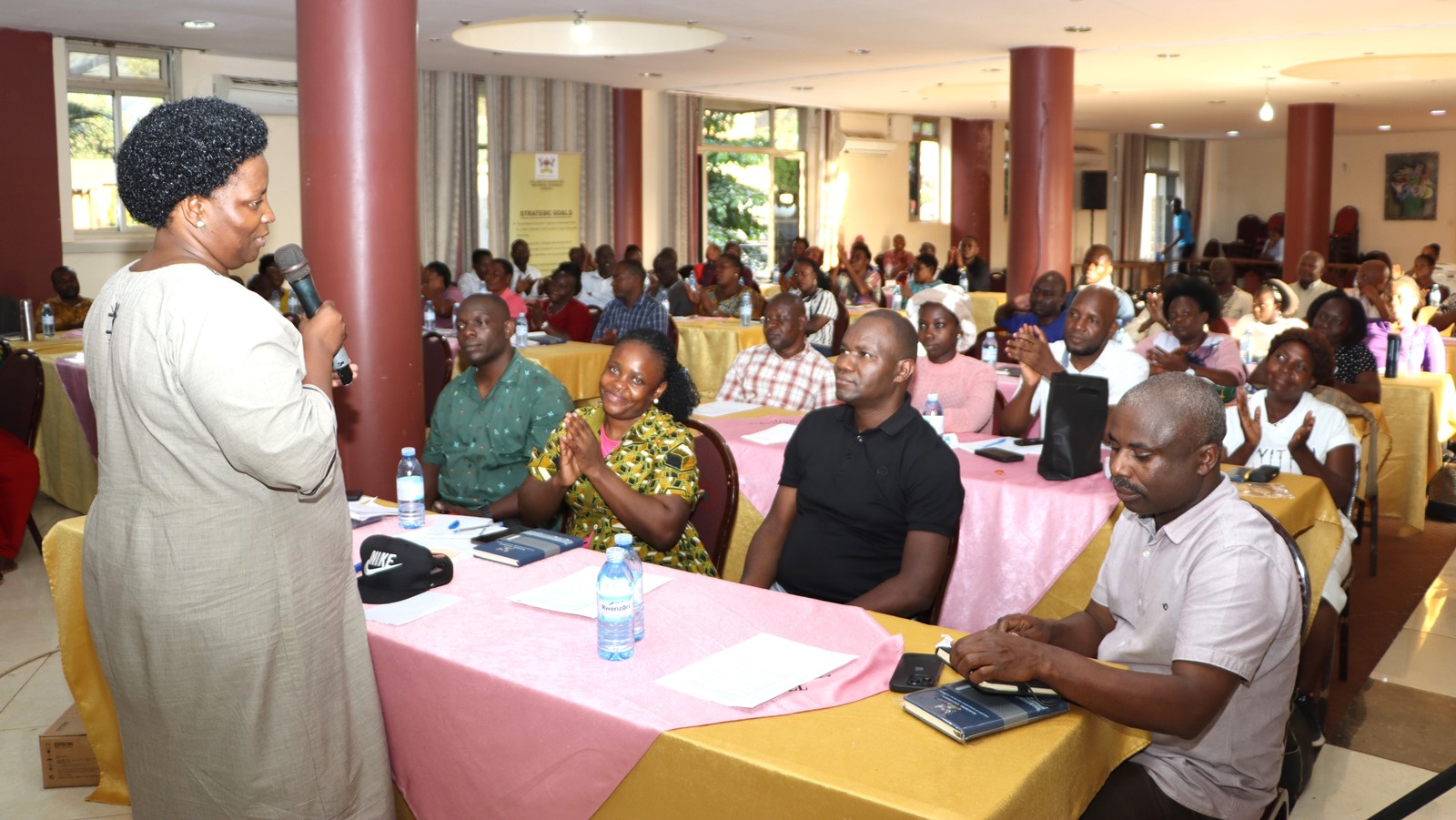
The College of Humanities and Social Sciences (CHUSS) at Makerere University held its first-ever non-academic staff retreat on December 7-8, 2024, at the Grand Global Hotel in Kikoni, a Kampala suburb. The retreat focused on customer care, quality assurance, professional work ethics, and human resource management. This landmark event, organized under the guidance of CHUSS Principal Prof. Helen Nambalirwa Nkabala, was aimed at fostering teamwork, reflecting on work practices, and strategizing ways to enhance service delivery and the university’s overall image.
The retreat brought together administrative and support staff to build networks, improve working environments, and align individual efforts with the university’s strategic goals. “We are here to learn, dialogue, and strategize together to improve our services in line with the university’s strategic direction. It starts with us,” said Prof. Nkabala in her opening remarks. She emphasized the collective responsibility of staff in achieving Makerere University’s vision.
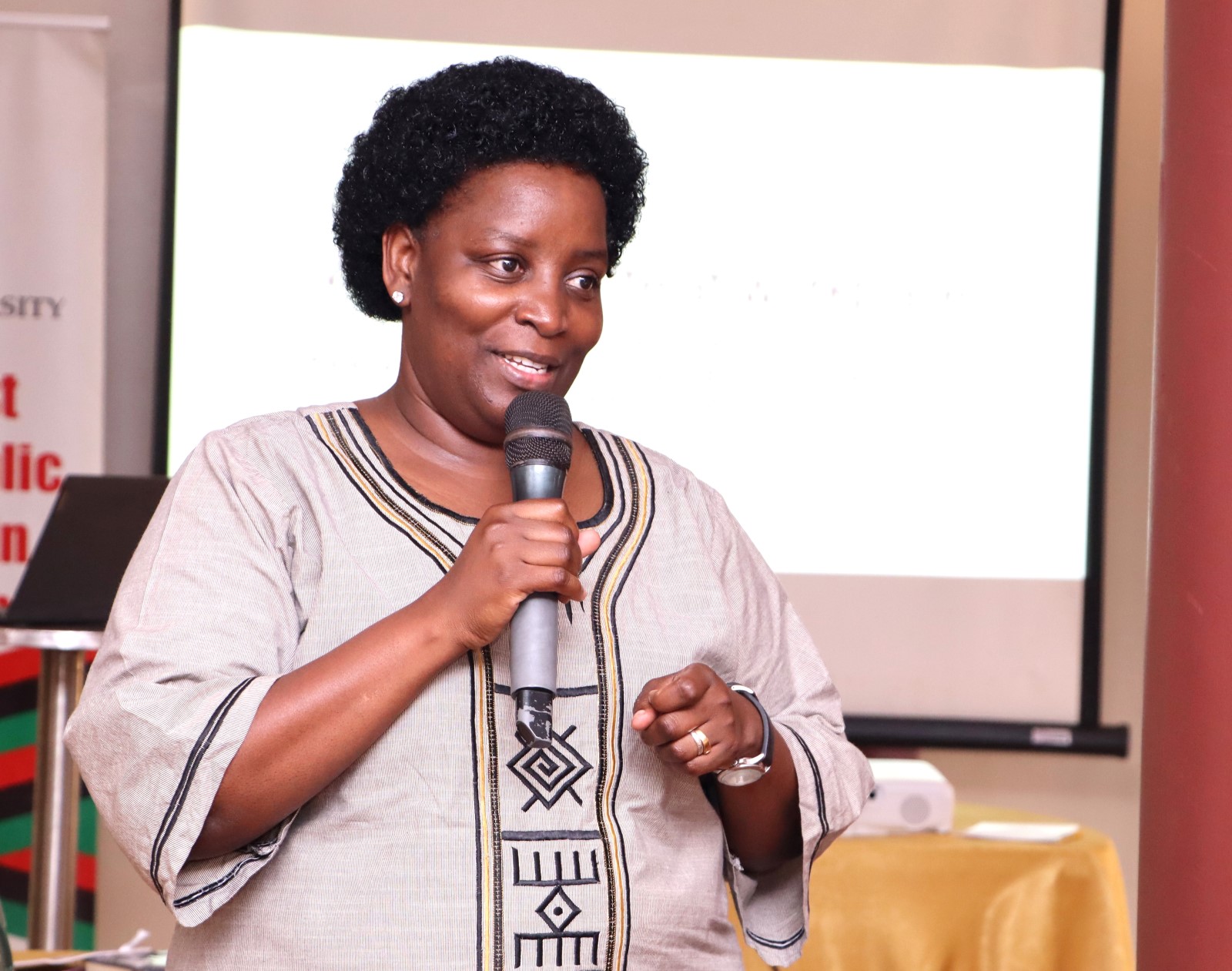
Prof. Nkabala also highlighted challenges such as inadequate staffing, particularly among security personnel and custodians, and called for the Human Resources Directorate to reconsider housing policies to support this vital group of workers.
In addition to formal sessions, the retreat featured interactive dialogues between staff and management, work place role plays, team-building exercises, and fitness training. A fireplace dinner provided a relaxed setting for staff to share concerns and suggestions. Activities like these rejuvenate the spirit and promote a sense of belonging.
Key Presentations and Insights
The retreat featured presentations from Makerere’s Director of Human Resources, Deus Tayari Mujuni; Chair of the CHUSS Quality Assurance Committee, Prof. Sylvia Nanyonga Tamusuza; Dr. Dickson Kanakulya, Head of the Department of Philosophy; and Dr. Gilbert Gumoshabe, Head of the Department of African Languages.
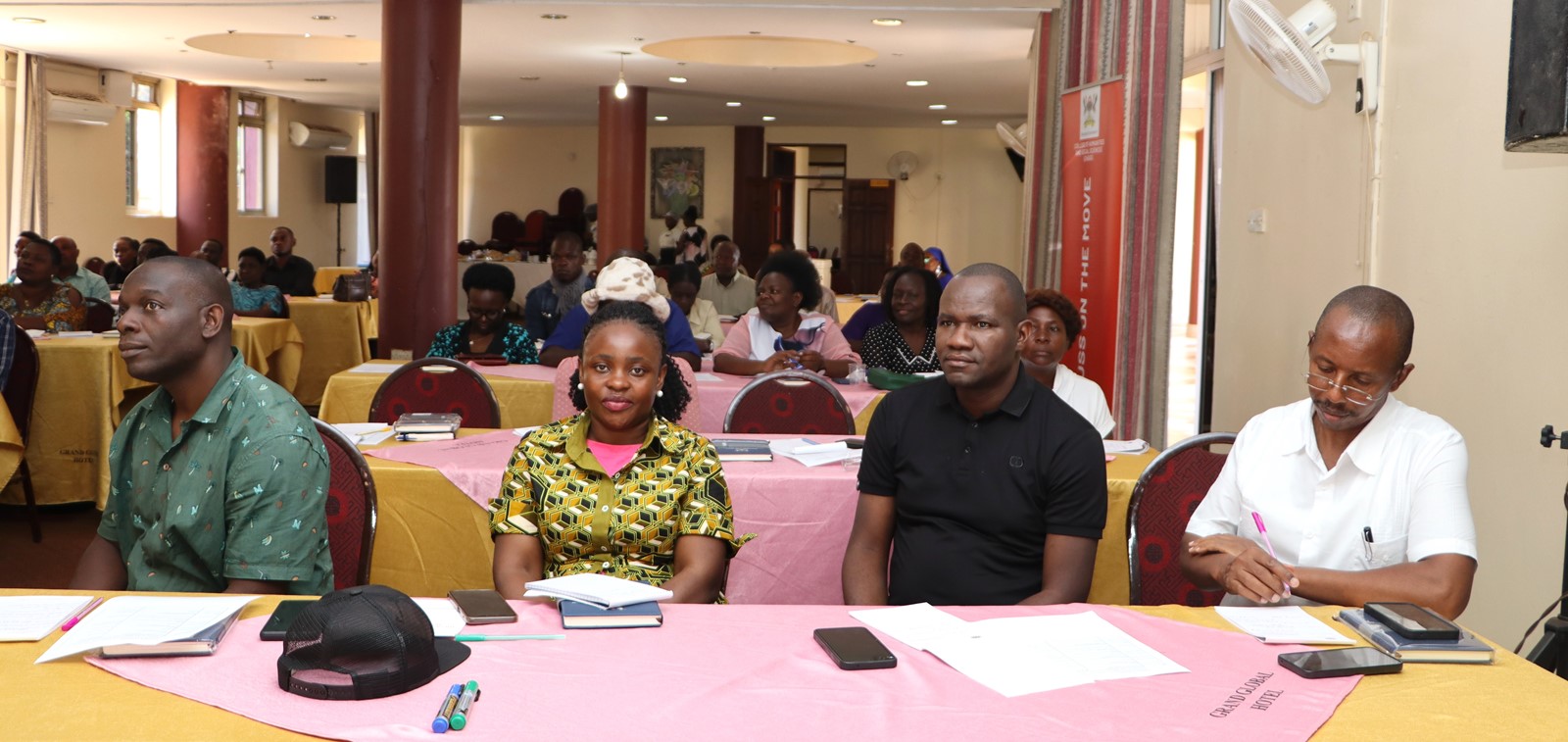
Love Your Work and Serve Clients Diligently- Dr. Gilbert Gumoshabe
Dr. Gilbert Gumoshabe, the Head of the Department of African Languages, presented on the importance of customer care in the workplace, focusing on how staff should attend to clients, particularly students, and the behavior expected of them while on the job. He began by emphasizing the importance of loving one’s work, regardless of the role. “Love your work. You applied for it. If you’re a secretary, PR, cleaner, or messenger, love your job. There is nothing more rewarding than people trusting you. Do your work with a smile,” he advised.
Dr. Gumoshabe discussed several key aspects of professional conduct, beginning with the importance of time management and serving clients diligently. He also highlighted the need for staff to leave personal beliefs, especially those related to witchcraft, outside the workplace. “Leave your beliefs like witchcraft behind the office. Witchcraft is real, and it moves in families. If you’re bewitching, what will happen when you’re bewitched? Always do to others what should be done to you. Avoid being jealous of those who do their work. If you focus on doing your job well, you won’t be chased, but if you indulge in witchcraft, you will be deceived. Sometimes you condemn yourself and slander others,” he said.
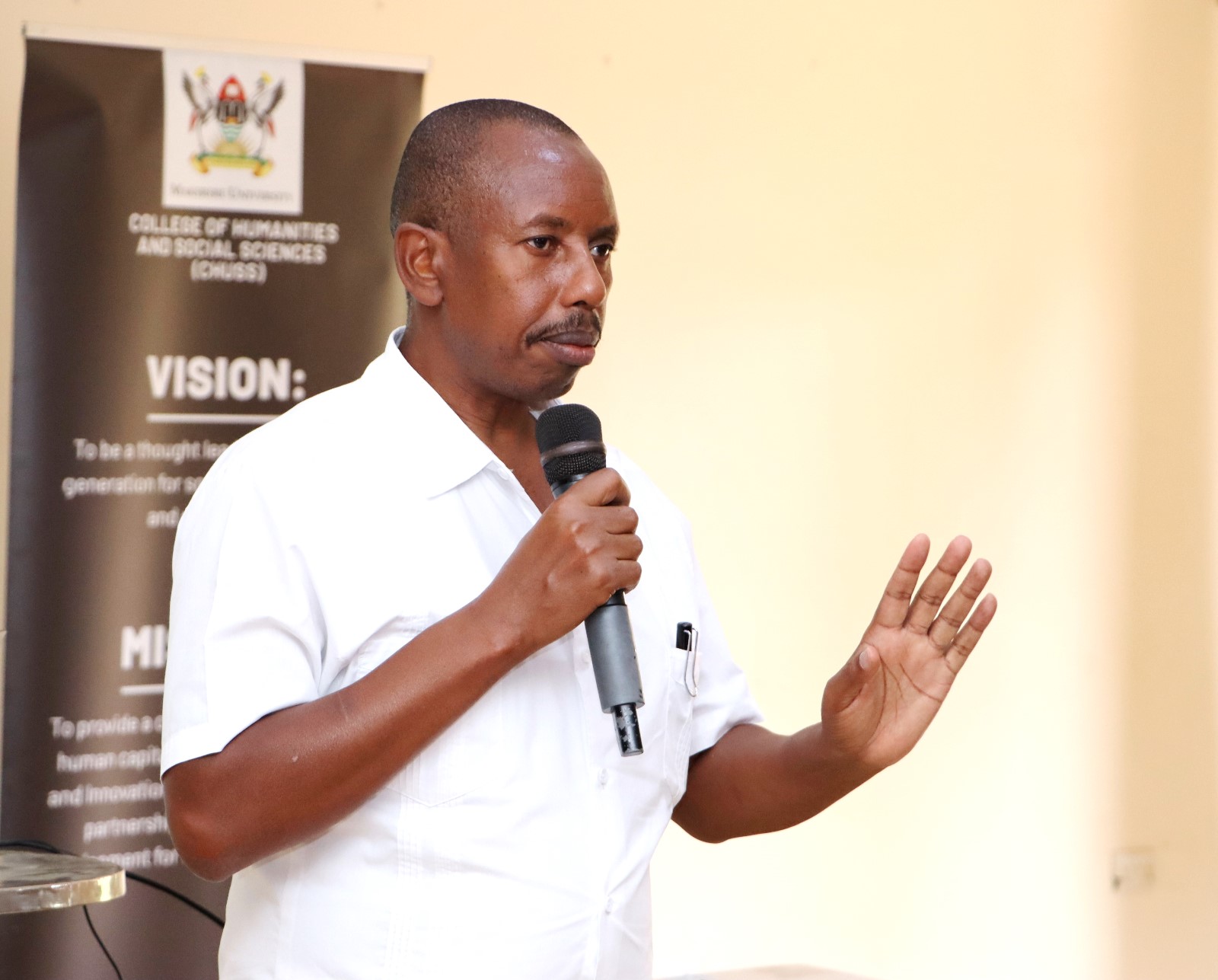
He also stressed the importance of professionalism in the workplace. Dr. Gumoshabe lectured staff on maintaining confidentiality, being polite in communication, greeting people with respect, and handling personal problems privately. He emphasized the need for staff to be friendly, responsible, and cooperative with colleagues and their leaders. Furthermore, he advised staff on maintaining personal hygiene and cultivating good habits. “Dress appropriately and be mindful of your shopping. Look for what fits you. No matter how much you want to attract love, your dressing matters. Avoid talking negatively about your supervisors, as all information that goes around comes around. There is no perfect person, and administrators want results,” Dr. Gumoshabe concluded.
Upholding Quality Standards: There must be a change in the image of our college and university- Prof. Tamusuza
Professor Sylvia Antonia Nanyonga Nakimera Tamusuza, the Chair of the CHUSS Quality Assurance Committee, addressed staff on the essential role of quality assurance in enhancing service delivery and improving the university’s reputation. She emphasized that quality begins with personal responsibility, encouraging staff to reflect on their work environments and professional conduct. “Quality is about doing things the best way and ensuring they meet the required standards,” she remarked, highlighting that teamwork, cleanliness, and attention to detail are vital components in maintaining high standards.
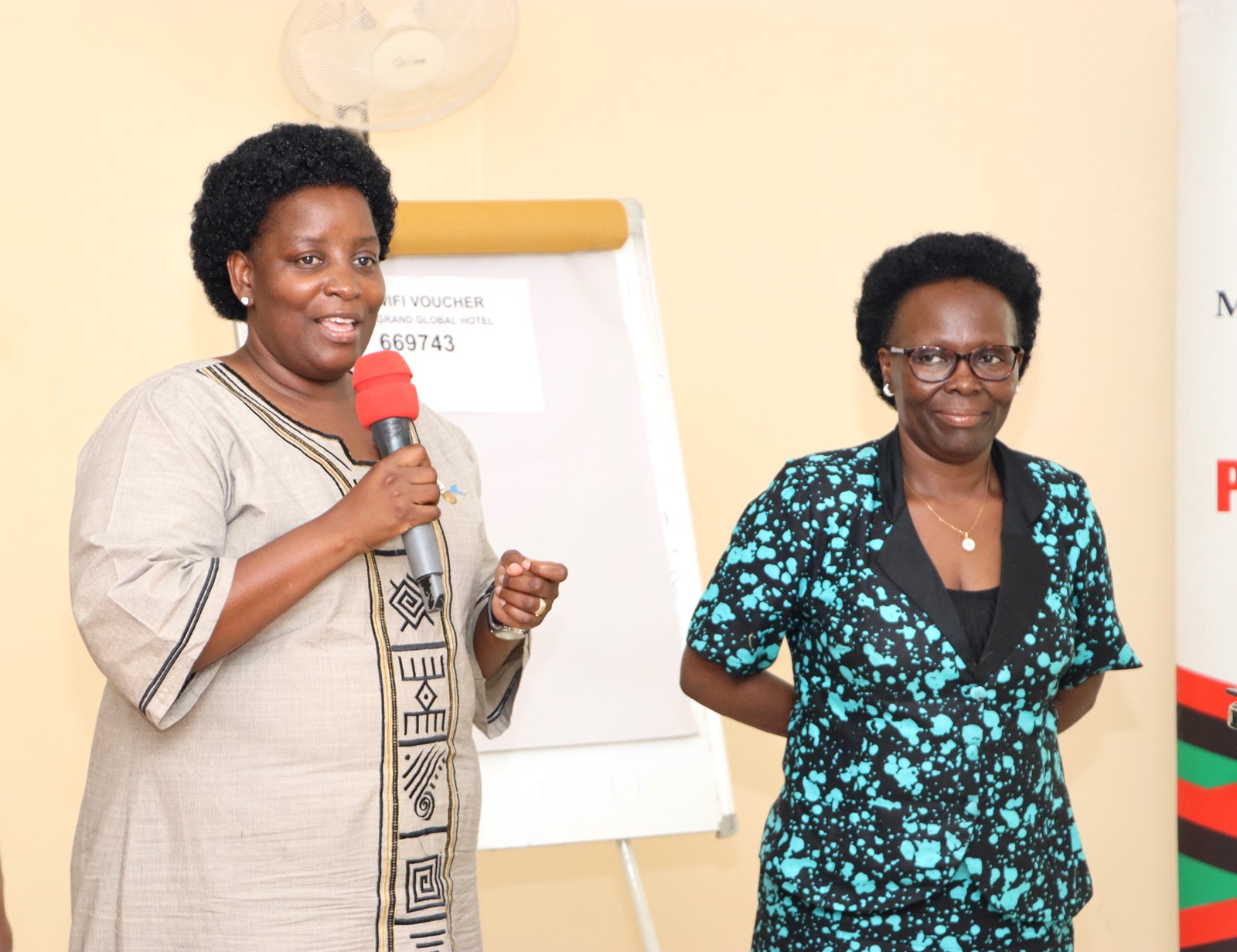
Professor Tamusuza warned against complacency and urged staff to embrace continuous improvement. She explained that quality assurance not only leads to better services and a more conducive working environment but also reduces complaints. “When there is quality, we will always smile when things are done well,” she said. She added that quality assurance contributes significantly to the university’s reputation, resulting in happier students and staff, and fostering a sense of pride within the university community.
To further elaborate, Professor Tamusuza highlighted the principles of quality assurance. She emphasized the importance of doing the right things consistently, checking work to ensure it aligns with assigned tasks, correcting mistakes, being efficient, managing time effectively, and promoting clear communication and teamwork. “We cannot change what we do unless we improve the quality of what we do. Let us think about efficiency and time management, and we should be people who pay attention to detail,” she stressed.
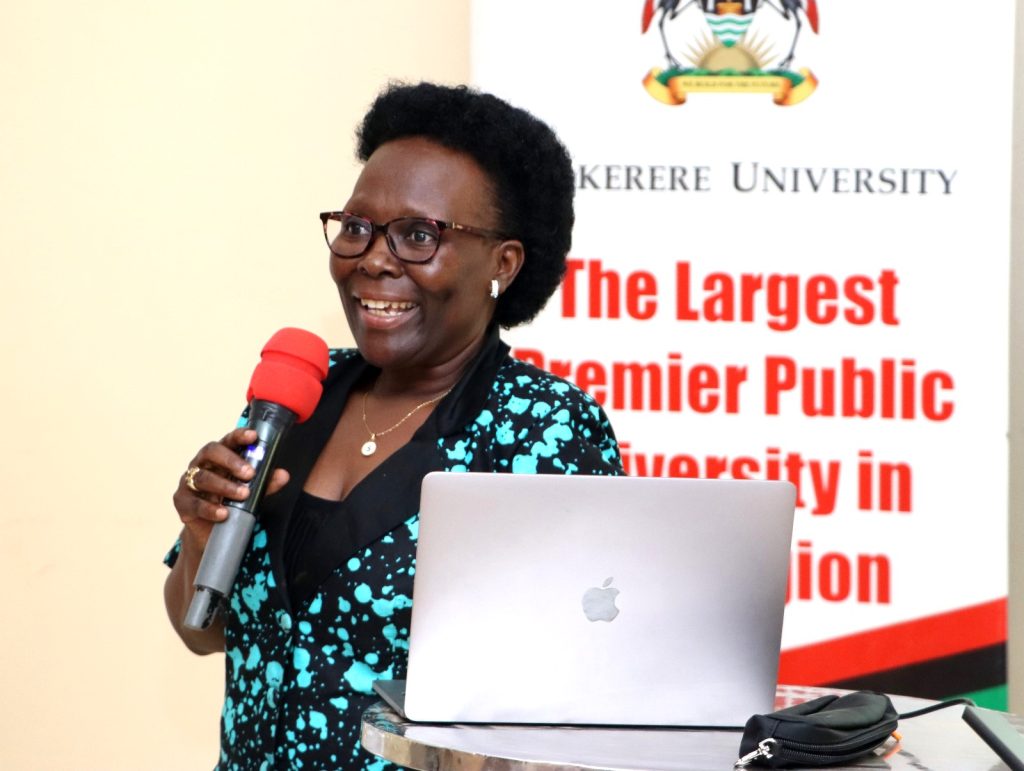
In addition, she underscored the critical role of staff in maintaining quality assurance, including keeping offices clean, greeting visitors politely, filing documents properly, ensuring cleanliness in toilets and compounds, arriving on time, and maintaining self-discipline at work. Creating a daily checklist for tasks, she suggested, is another way to ensure quality.
“Remember, you hold the quality of the work in the place where you work. Whether it’s a professor, student, or visitor, please handle them properly because we are here because they are here,” Professor Tamusuza emphasized. She concluded by stressing the need for a shift in the image of the college and university, noting that this change starts with each individual. “There must be a change in the image of our college and university because of the services we offer. It begins with me,” she declared.
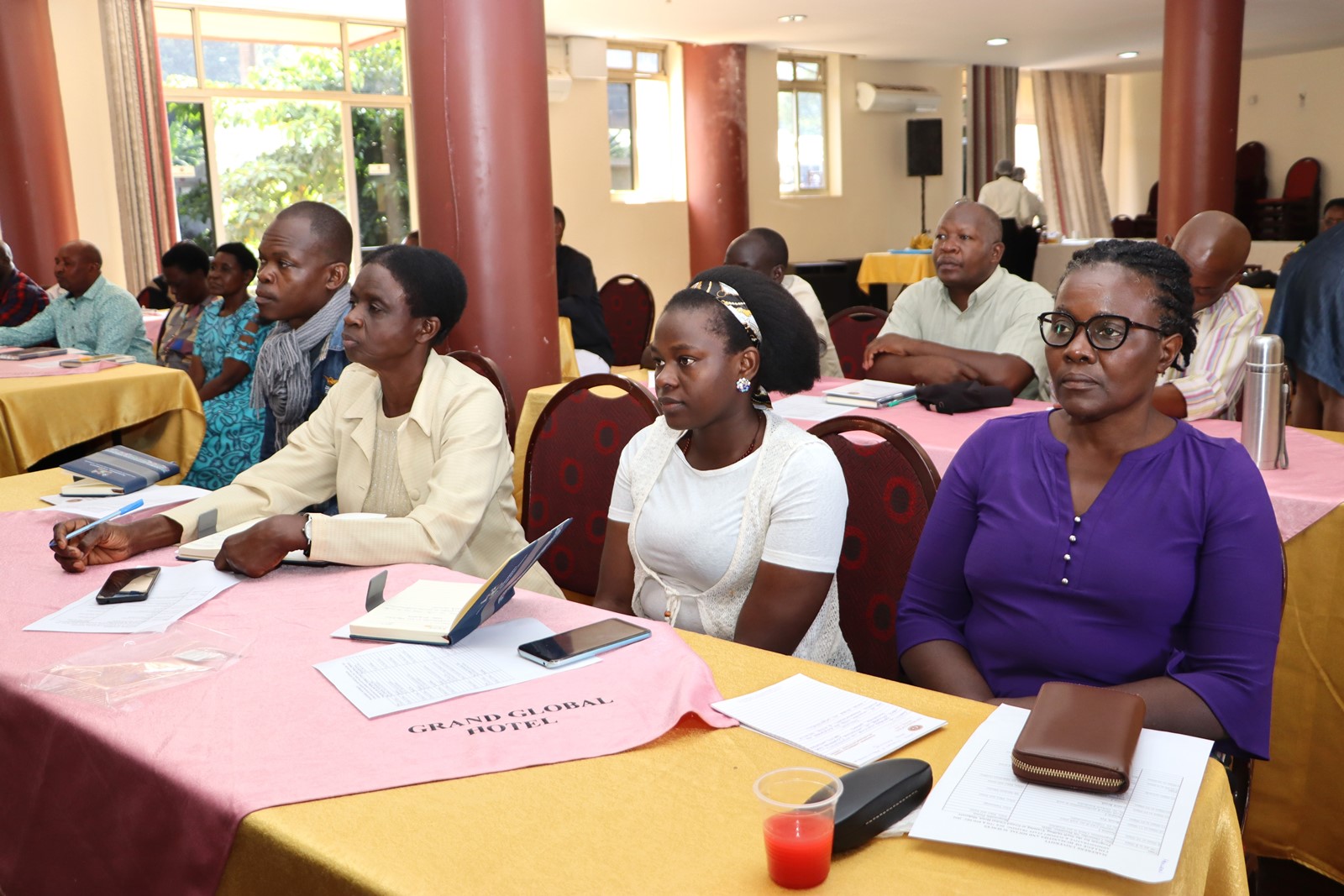
Offering motivational advice, she shared that quality is not just an action but a habit that everyone must cultivate. “Every small thing makes a difference. Doing your work well helps you remain healthy. Your work helps Makerere shine,” she concluded.
Work Ethics and Professionalism by Dr. Dickson Kanakulya
Dr. Dickson Kanakulya delivered a compelling session on the importance of work ethics and professionalism, emphasizing that a strong work ethic is the foundation for high performance and institutional success. He discussed how attitude, ethical behavior, and professionalism are integral to creating a productive and harmonious work environment.
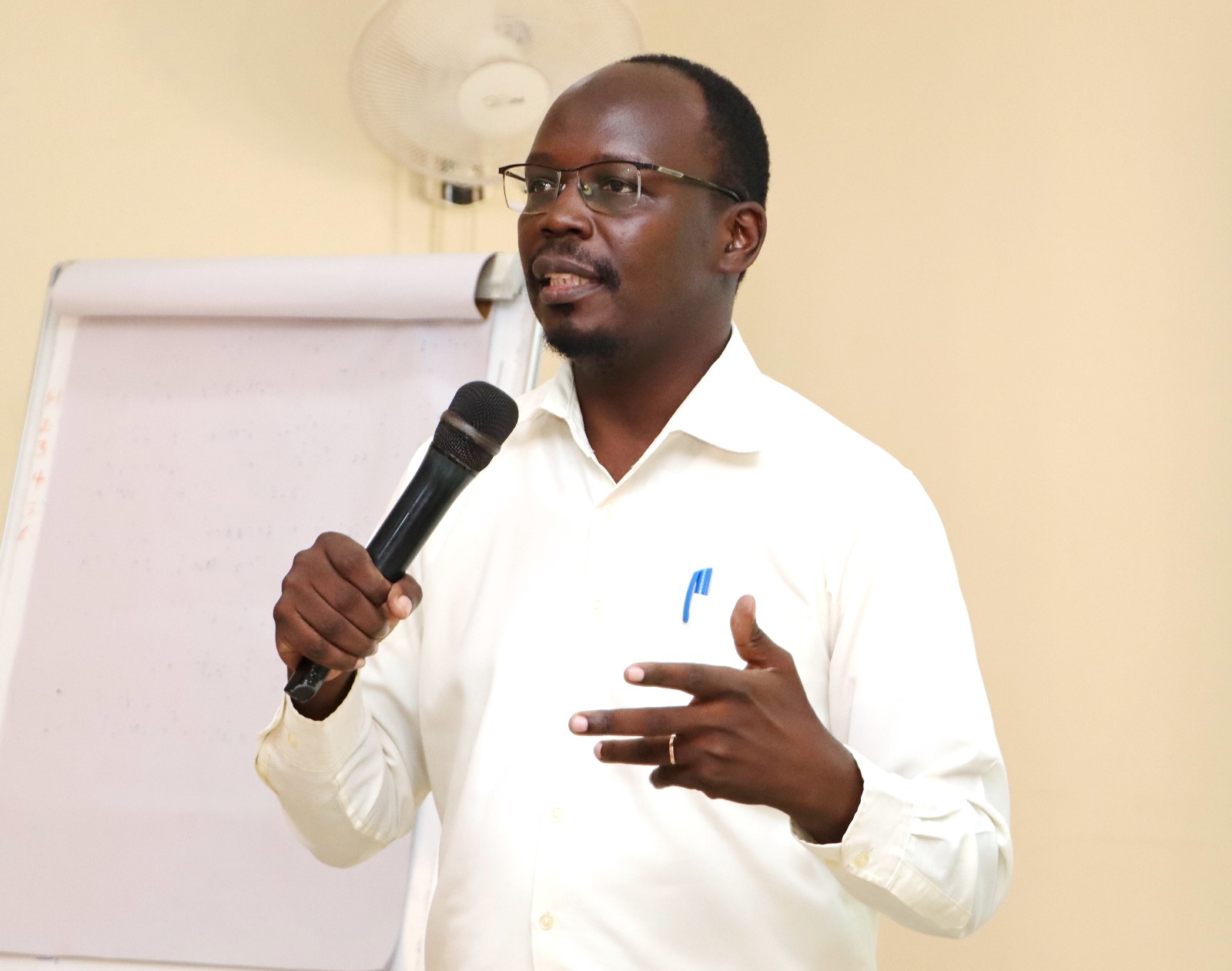
In his presentation, Dr. Kanakulya underscored the transformative power of a positive attitude, describing it as essential for workplace success. “A negative attitude is like a flat tire—you won’t get anywhere until you change it,” he remarked. He explained that cultivating a positive outlook not only boosts personal engagement but also fosters productivity and collaboration among colleagues.
Dr. Kanakulya also reminded staff of the importance of aligning their actions with Makerere University’s core values of integrity, accountability, and respect. Ethical conduct, he emphasized, is critical for building trust, strengthening teamwork, and enhancing the university’s reputation as a global knowledge hub. “Ethical conduct builds trust, strengthens teamwork, and contributes to Makerere’s standing as a global knowledge hub,” he stated, highlighting how these principles serve both the individual and the institution.
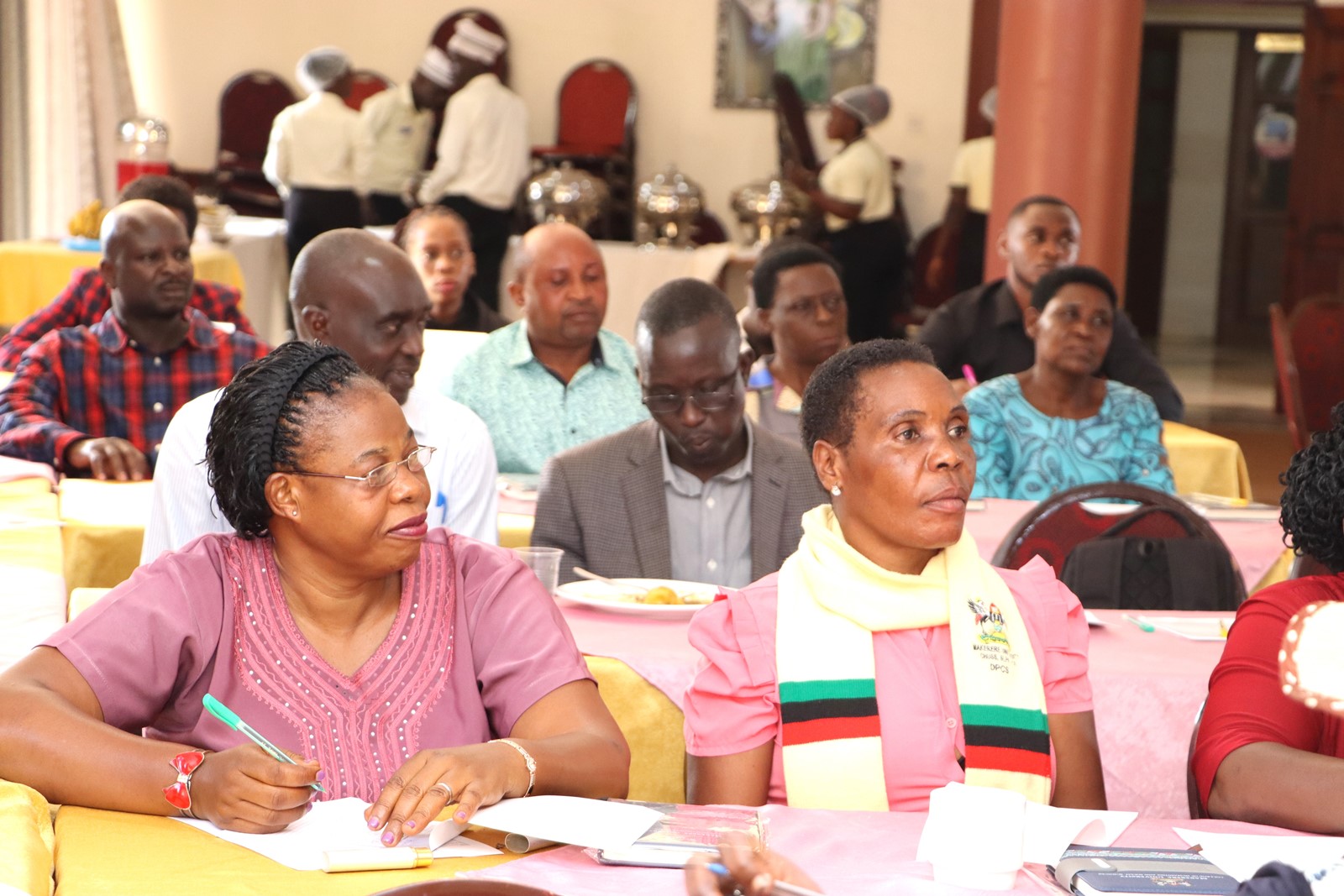
He further stressed the importance of efficient use of time, urging staff to manage their schedules effectively and ensure that their tasks are completed in a timely manner. Efficiency, he noted, is a hallmark of professionalism and a vital component of high performance. Additionally, he encouraged staff to pay close attention to detail in their work, explaining that professionalism requires care and precision to uphold the university’s high standards.
Through his engaging presentation, Dr. Kanakulya illustrated how embracing ethical principles, maintaining a positive attitude, and demonstrating professionalism can enhance individual performance while contributing to Makerere University’s strategic vision.
HR Reforms to Streamline Operations– Chief HR Deus Mujuni
Chief Human Resource Officer, Deus Tayari Mujuni detailed Makerere University’s revised Human Resources policies, aimed at enhancing efficiency and compliance with employment laws. Addressing the retreat, he outlined updates from the amended 2009 HR Manual, which emphasize recruitment protocols, leave management, and payroll accuracy.
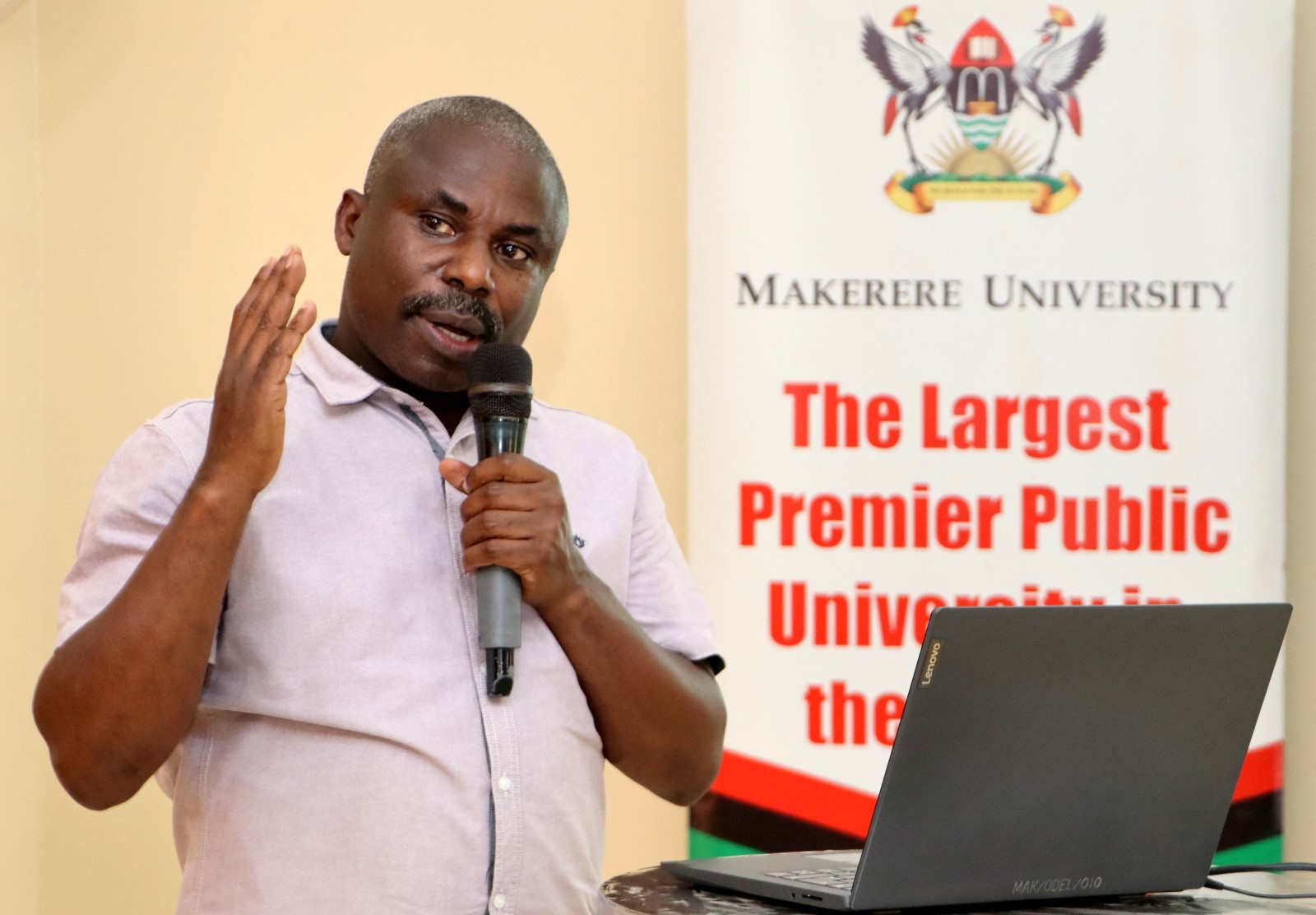
Mujuni reported that Makerere University has rolled out significant updates to its Human Resources (HR) policies, aiming to streamline staff management and ensure compliance with labor laws. The changes, unveiled by the university’s Human Resources Director, Deus Tayari Mujuni, focus on recruitment, leave management, performance evaluation, and payroll systems, as detailed in the revised 2009 HR Manual.
“The manual consolidates policies, procedures, and practices to guide the recruitment, development, and retention of staff,” Tayari explained, emphasizing its critical role in defining the responsibilities of the University Council and employees.
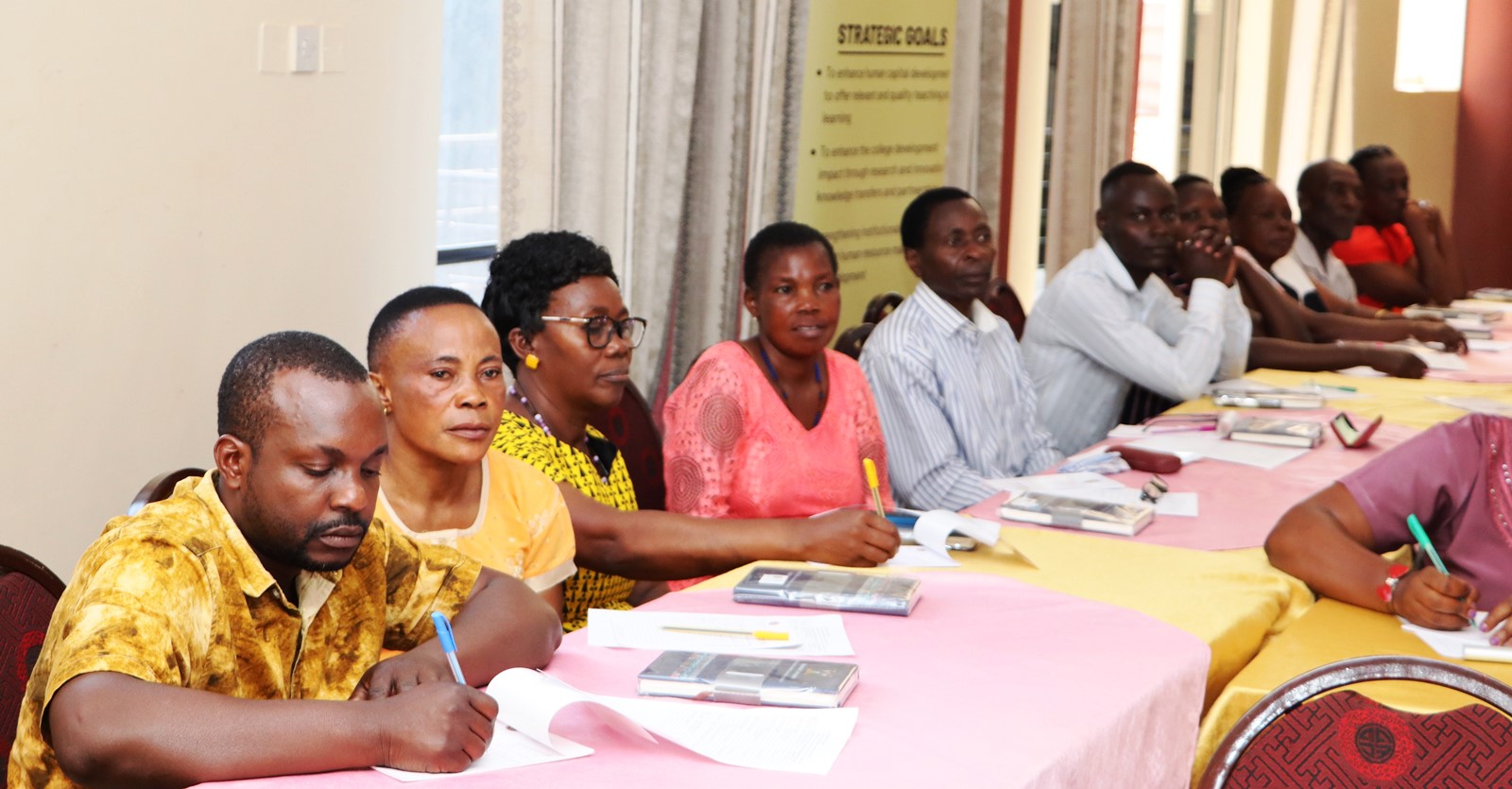
A key reform mandates that, starting FY 2024/2025, unit-level appointments funded by non-wage budgets will be prohibited, ensuring such funds prioritize teaching and research. The University Council reaffirmed this during its May 9, 2024, meeting, emphasizing that all salaries must align with the designated wage budget.
Tayari also underscored the expanded duties of line managers, which include monitoring performance, overseeing leave compliance, and ensuring accurate payroll management. Notably, staff on study leave must now submit signed bonding agreements and periodic progress reports, with failure to return from leave classified as misconduct under Section 9.6 of the HR Manual.
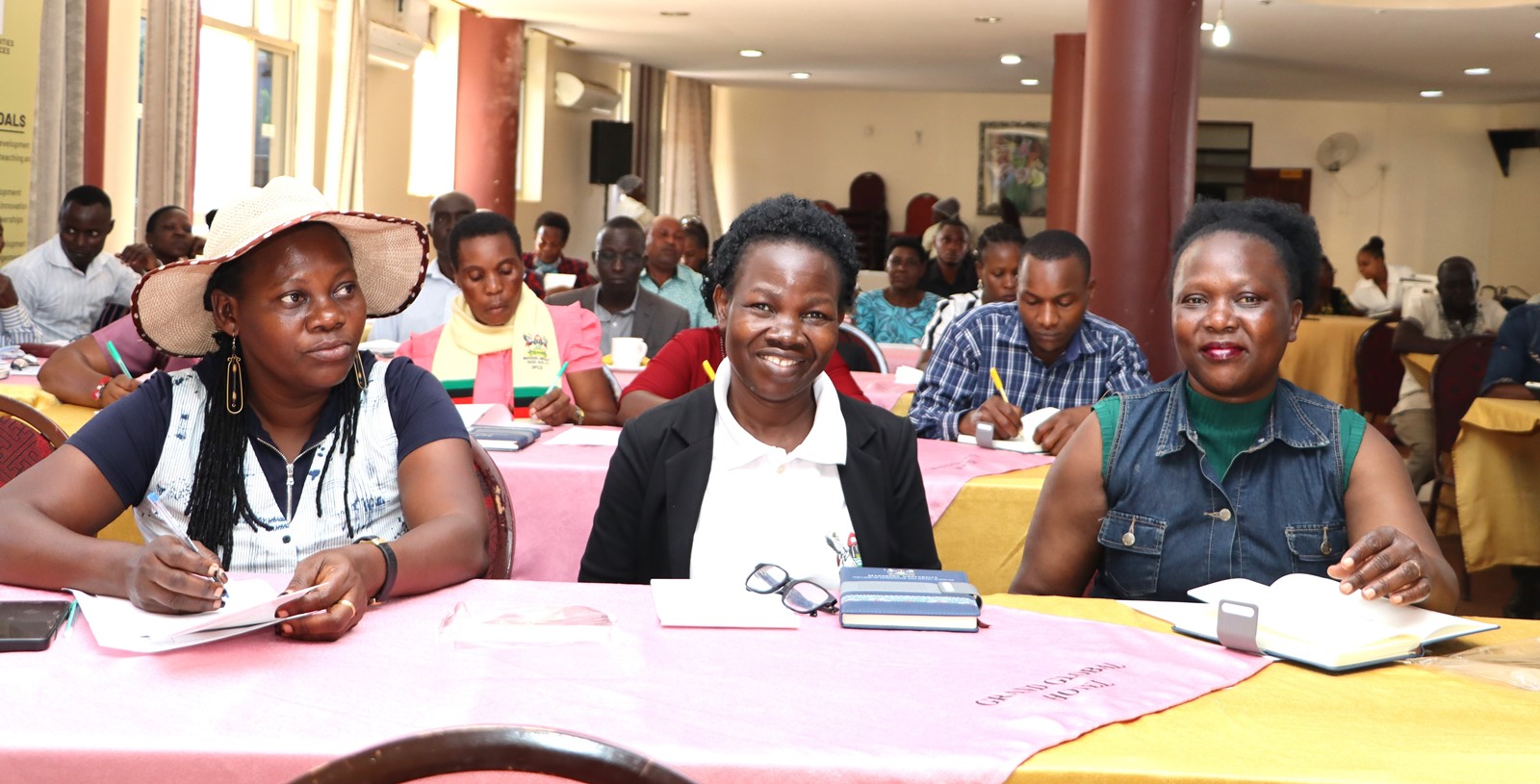
The revisions also enhance payroll accuracy by requiring timely updates about inactive staff receiving salaries. Occupational safety and health measures have been bolstered to comply with the Occupational Health and Safety Act.
“These updates aim to propel Makerere into becoming a high-performance institution by aligning individual and organizational goals,” Tayari concluded. The reforms are expected to improve efficiency, accountability, and institutional alignment with Makerere’s strategic vision.
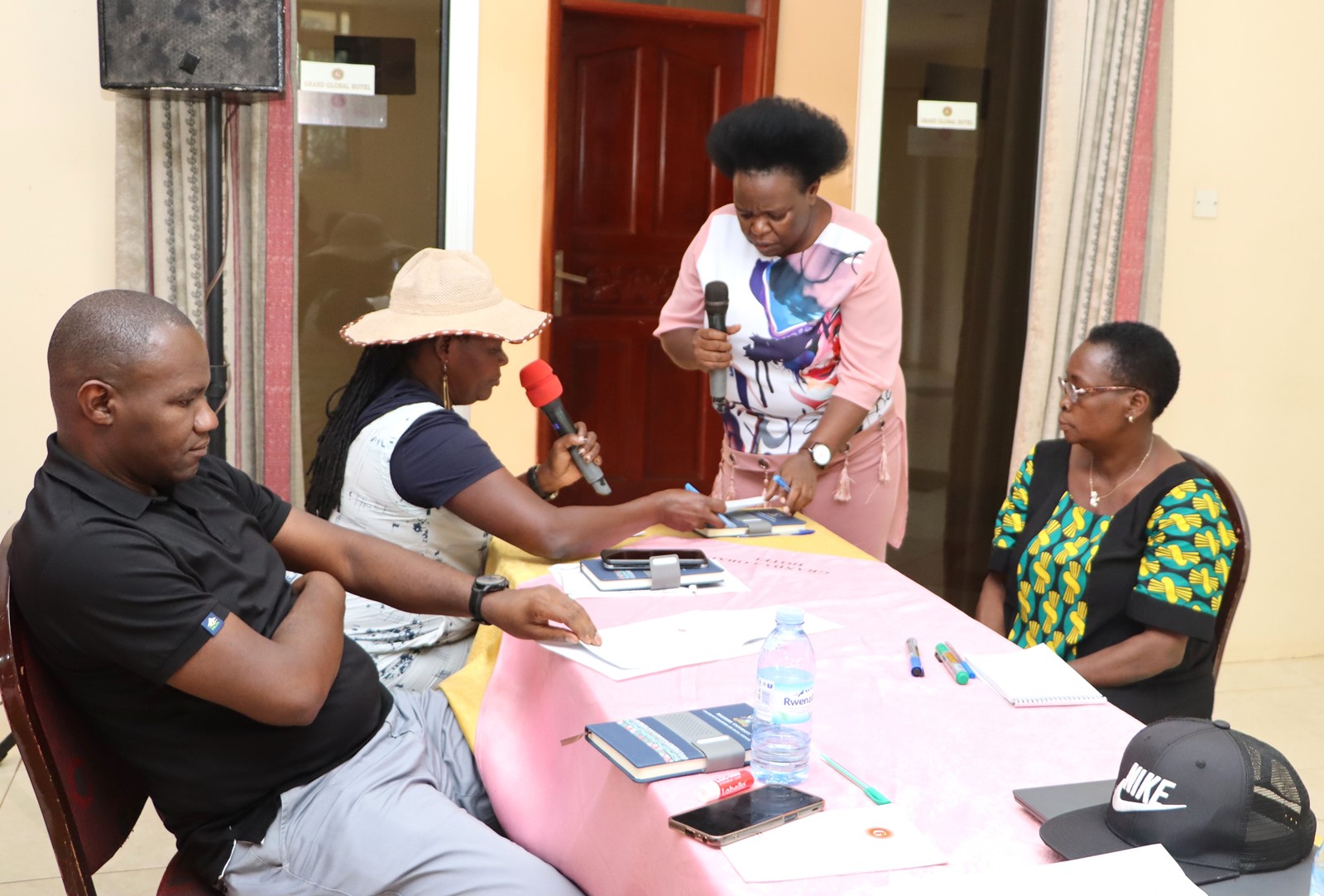
Participants react
The retreat underscored the critical role of non-academic staff in achieving Makerere University’s vision as a global knowledge hub. The event concluded with a collective commitment to apply the insights gained, ensuring that CHUSS remains a model of excellence within Makerere University.
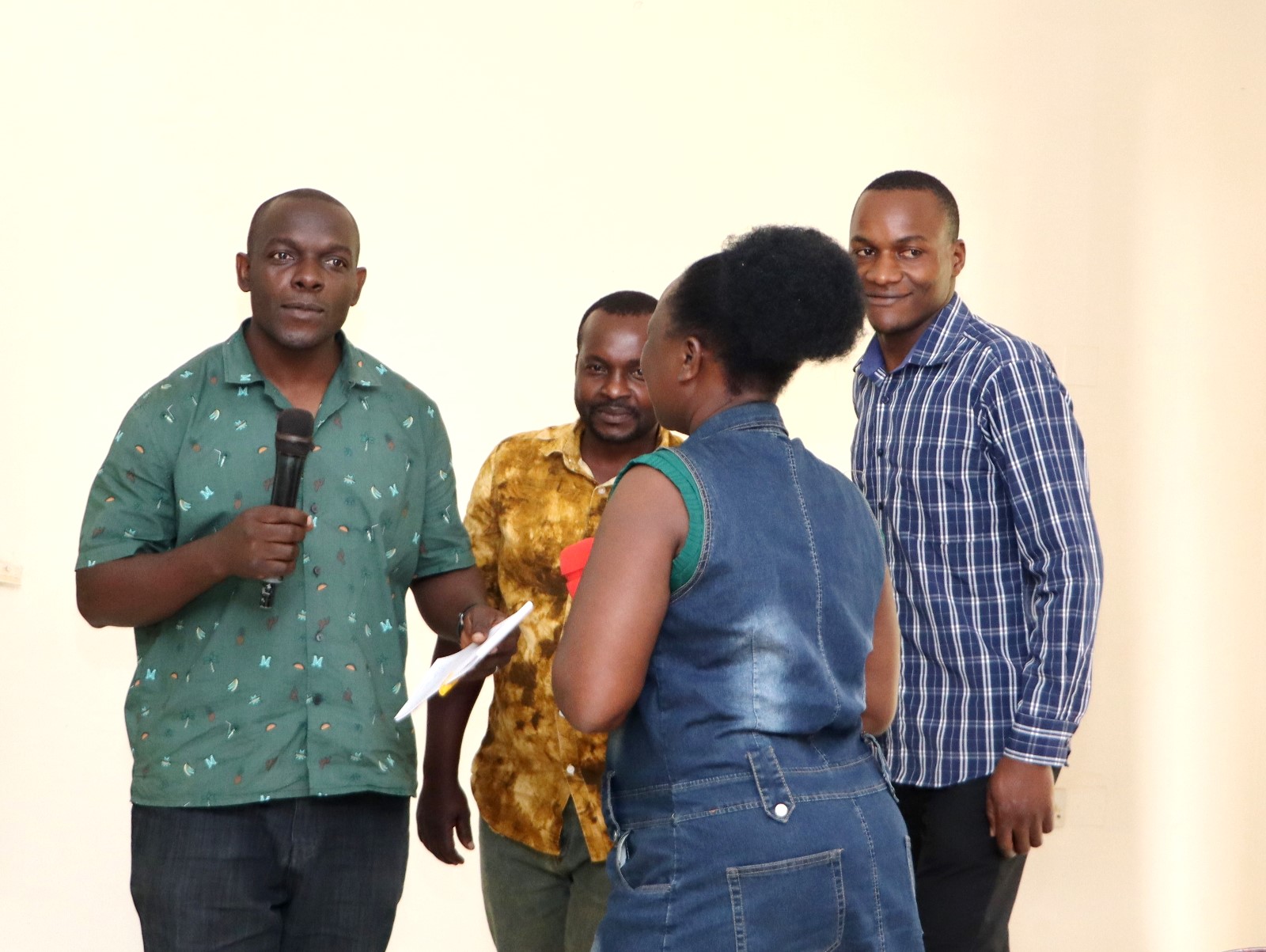
Participants expressed gratitude for the retreat and praised its relevance to their roles.
Sunday Seezi, Chief Custodian, shared:
“This retreat was a first of its kind for us as non-teaching staff. Many times, we hear of workshops for academic staff, but this time we felt seen and valued. The activities were well-organized, and we left with valuable lessons to implement in our daily work. We appreciate our Principal for this initiative.”
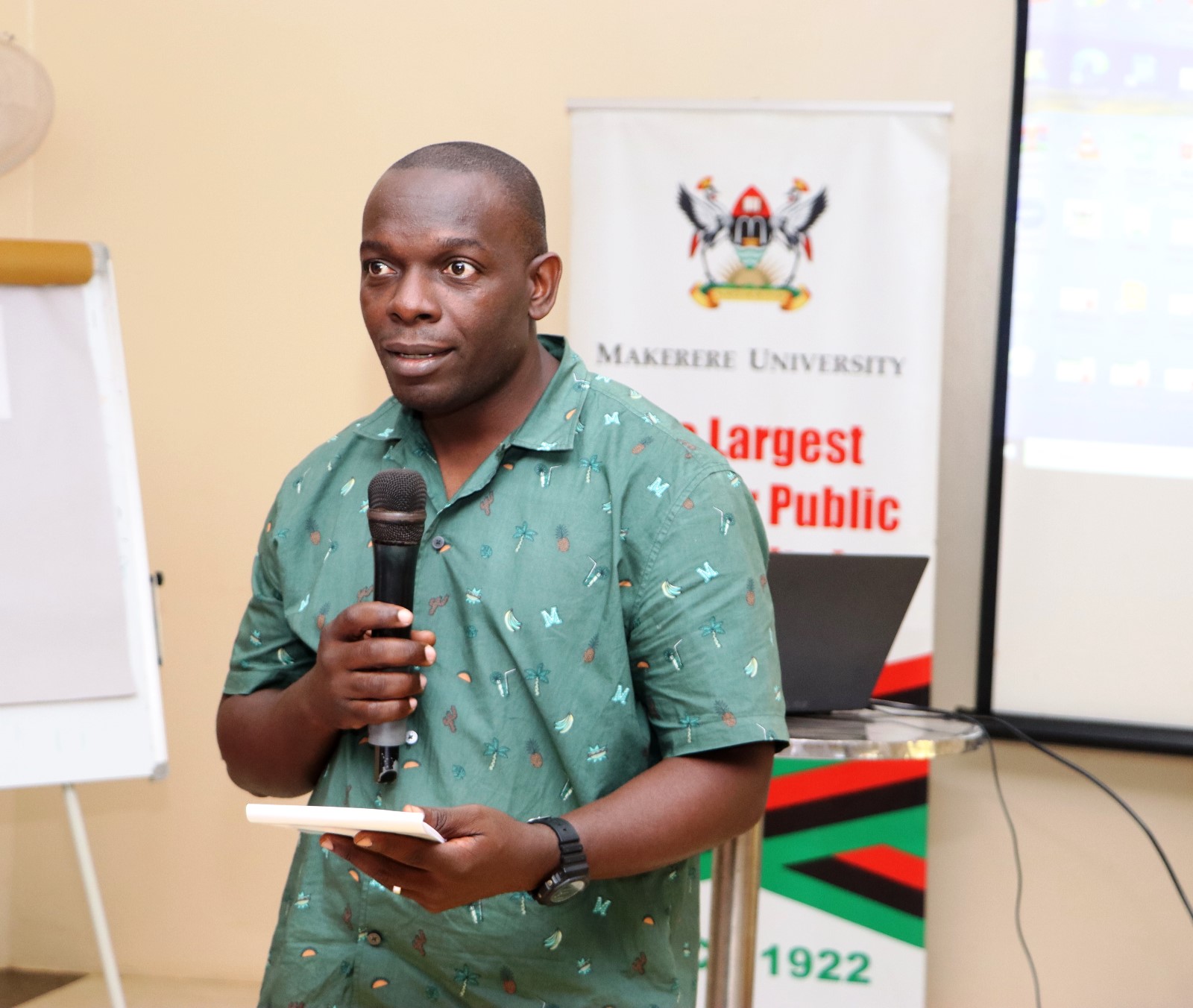
Rebecca Talikaza, another custodian, added:
“We are indeed happy to be included in such an event. The choice of the hotel was excellent—we slept well, ate well, and learned a lot. The presentations were rejuvenating, and I believe everyone who attended has a changed mindset. However, I suggest that next time, participants be given certificates of attendance. It would mean a lot to many of us who don’t have formal academic qualifications.”
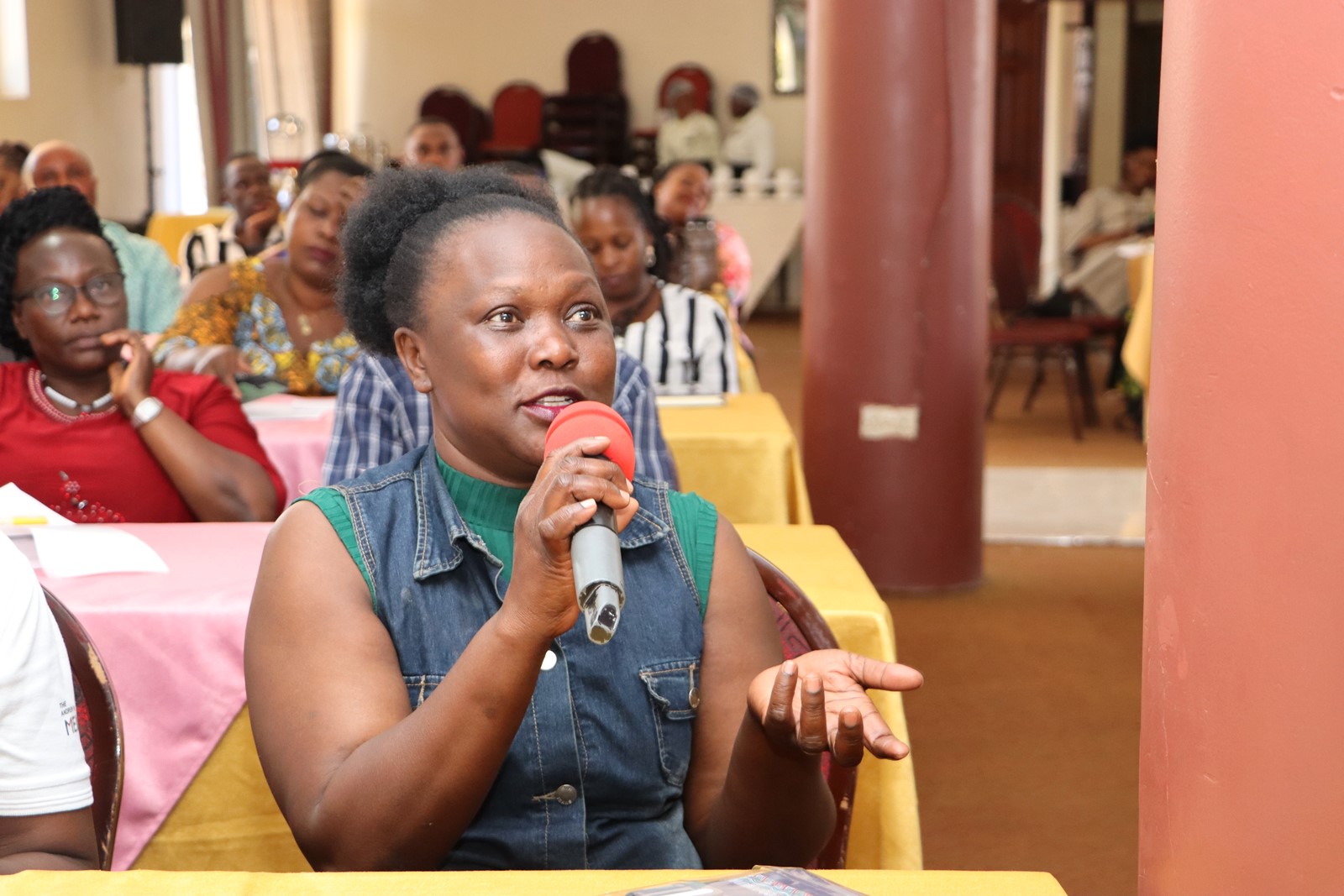
Annet Nakaye, a cleaner and messenger, noted:
“This was my first time attending such a workshop. I learned a lot about how to improve my work and serve better. I am grateful to our Principal for thinking about us. We promise to improve where we have been falling short.”
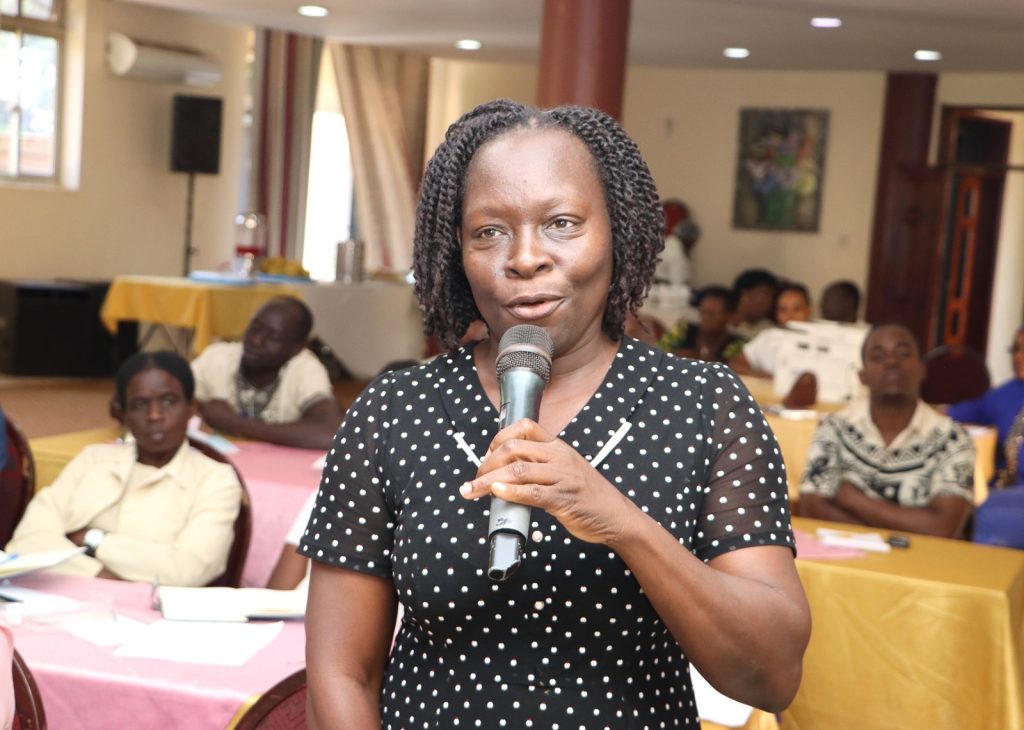
The retreat reaffirmed that achieving institutional goals requires the dedication and collaboration of every member of the university community.
You may like
-


76th Graduation Highlights
-
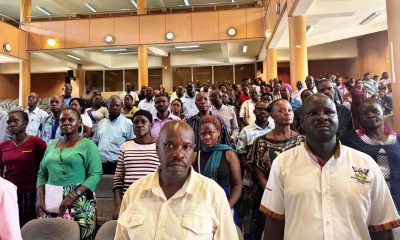

Support Staff Trained to Promote Safety of Students and Stakeholders
-
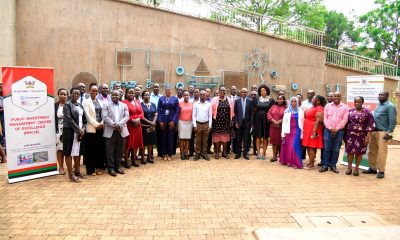

Makerere Hosts Second Cohort of MoKCC&MA Procurement Officers for E&S Safeguards Training
-
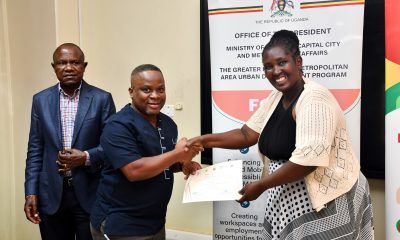

PIM Centre Awards Certificates to MoKCC&MA Officers after Safeguards Training
-


Call for Applications: Short Course in Molecular Diagnostics March 2026
-
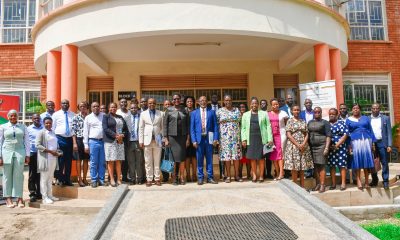

VC Opens Training for MoKCC Officials on Safeguards in Procurement
Humanities & Social Sciences
Meet Najjuka Whitney, The Girl Who Missed Law and Found Her Voice
Published
2 days agoon
February 23, 2026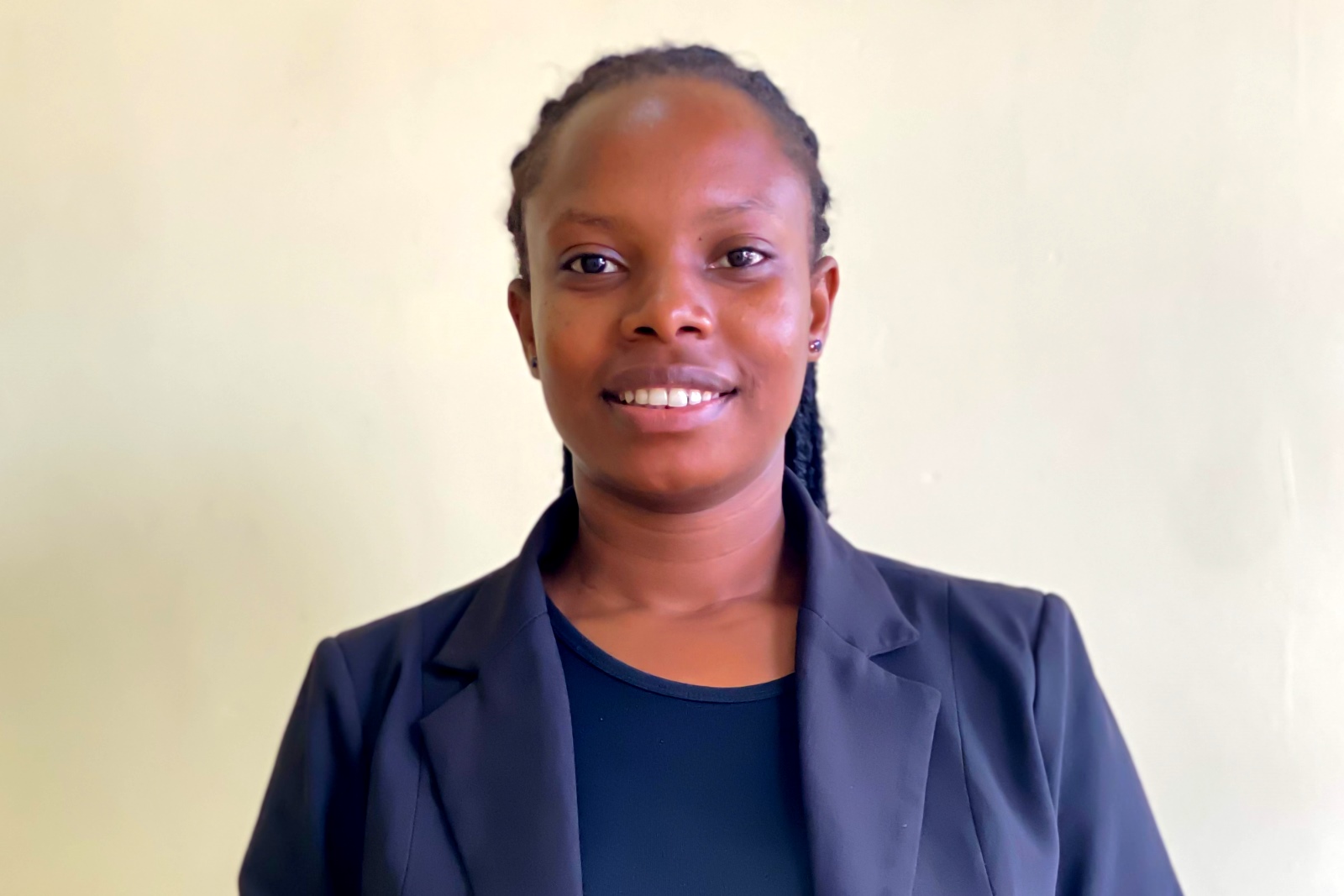
On the morning of Friday, February 27, when the academic procession winds its way across Makerere University’s Freedom Square for the last day of the 76th Graduation Ceremony, Whitney Najjuka will walk into history with a number beside her name: 4.46.
At Makerere, that number means First Class Honours. It means the Vice Chancellor’s List. It means she graduates as the only First-Class student in Journalism and Communication this year. But numbers, as Whitney has learned, rarely tell the full story.
Born on March 27, 2002, in Nabbingo, Kyengera Town Council, to Margaret Kusemererwa and Fred Kasirye, dreamt she would do Law, one of the disciplines, prestigious, almost inevitable next steps for a student who had excelled in secondary school. She had done everything correctly. Studied hard. Scored well. Followed the script.
But Makerere University had other plans. She missed the pre-entry mark, but found her name under Journalism and Communication, another prestigious course offered by the Journalism and Communication Department at Makerere University.
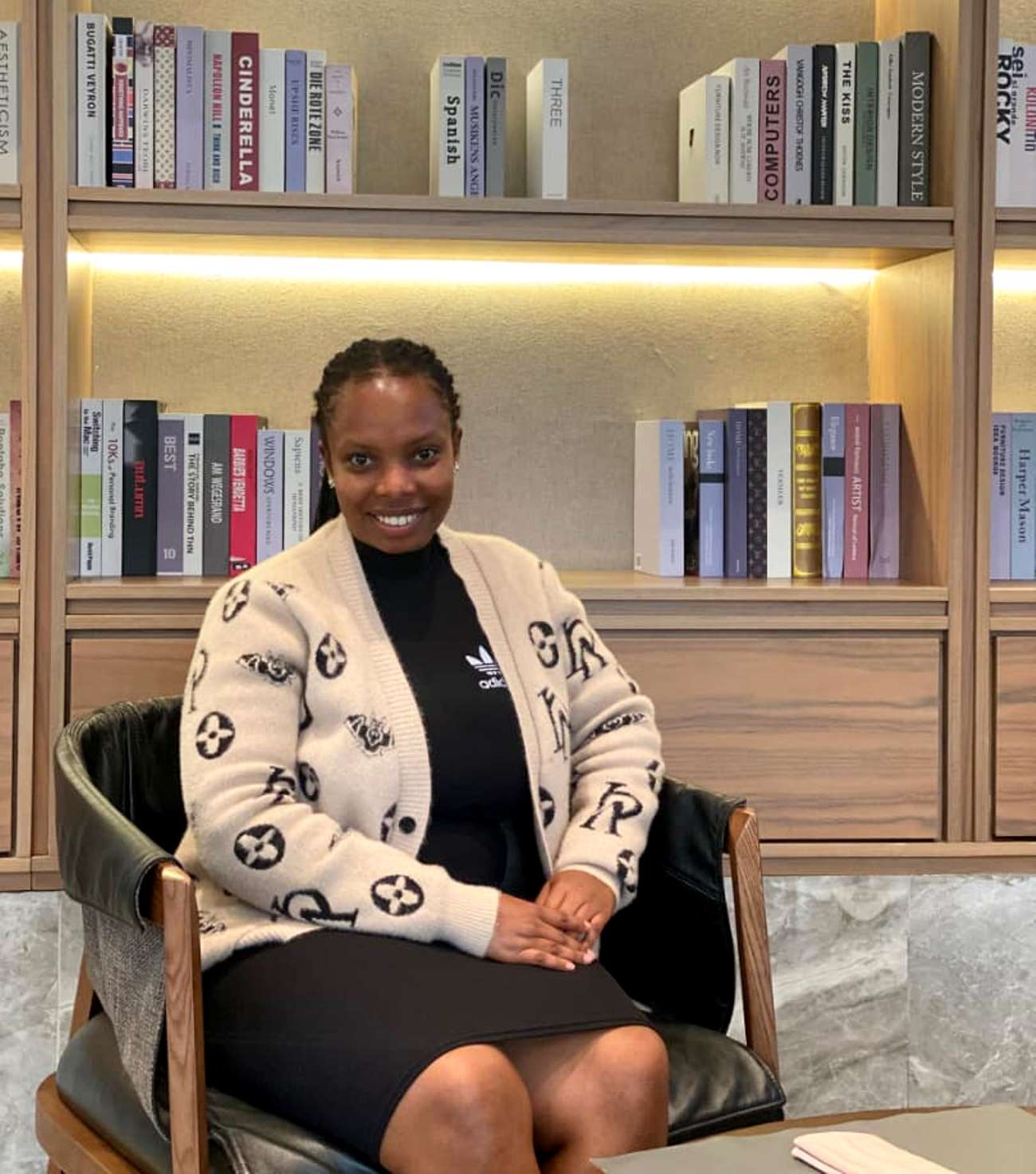
Najjuka began her academic journey at Muto Primary School in Buwama, earning 8 aggregates in the Primary Leaving Examination, a performance that positioned her strongly for secondary school.
She would later join St. Lucia Hill School, Namagoma, where she earned 20 aggregates at O-Level and 17 points in History, Luganda, and Divinity at A-Level.
Missing her dream course, Law, felt at first, like a detour. But Whitney was encouraged by Sanyu Christopher, her uncle, and she settled for a government-sponsored slot in the Bachelor of Journalism and Communication at Makerere, which she had applied for before.
She entered uncertain. But she graduates transformed.
The Pivot That Became a Purpose
Whitney speaks of her early university days with candor. She did not arrive at the Department of Journalism and Communication with a burning childhood ambition to be a journalist, but because another door had closed.
Then, Social and Behavior Change Communication happened. Applied Strategic Communication happened. She began to see media not as headlines and microphones, but as architecture, shaping how societies think, argue, and act.
The turning point came in her third year. The Female Journalist Foundation published her story on Sexual Gender-Based Violence (SGBV) and its emotional toll on survivors. What startled her was not its publication but the reaction. Comments flooded in. Debates ignited, especially about the role of men in combating GBV.
“I realized media doesn’t just report,” she says. “It frames how society views a crisis.”
Her voice, once tentative, had entered a national conversation.
The Discipline Behind 4.46
At Makerere University, a First Class CGPA is not built on brilliance alone but on ritual.
Whitney’s ritual began with showing up, on time, every time. She treated lectures as appointments with her future self. She refused to confine her learning to the syllabus. While attending workshops at the Aga Khan Graduate School of Media and Communication and obtaining external certifications, she sought and was open to mentorship through the Public Relations Association of Uganda (PRAU).
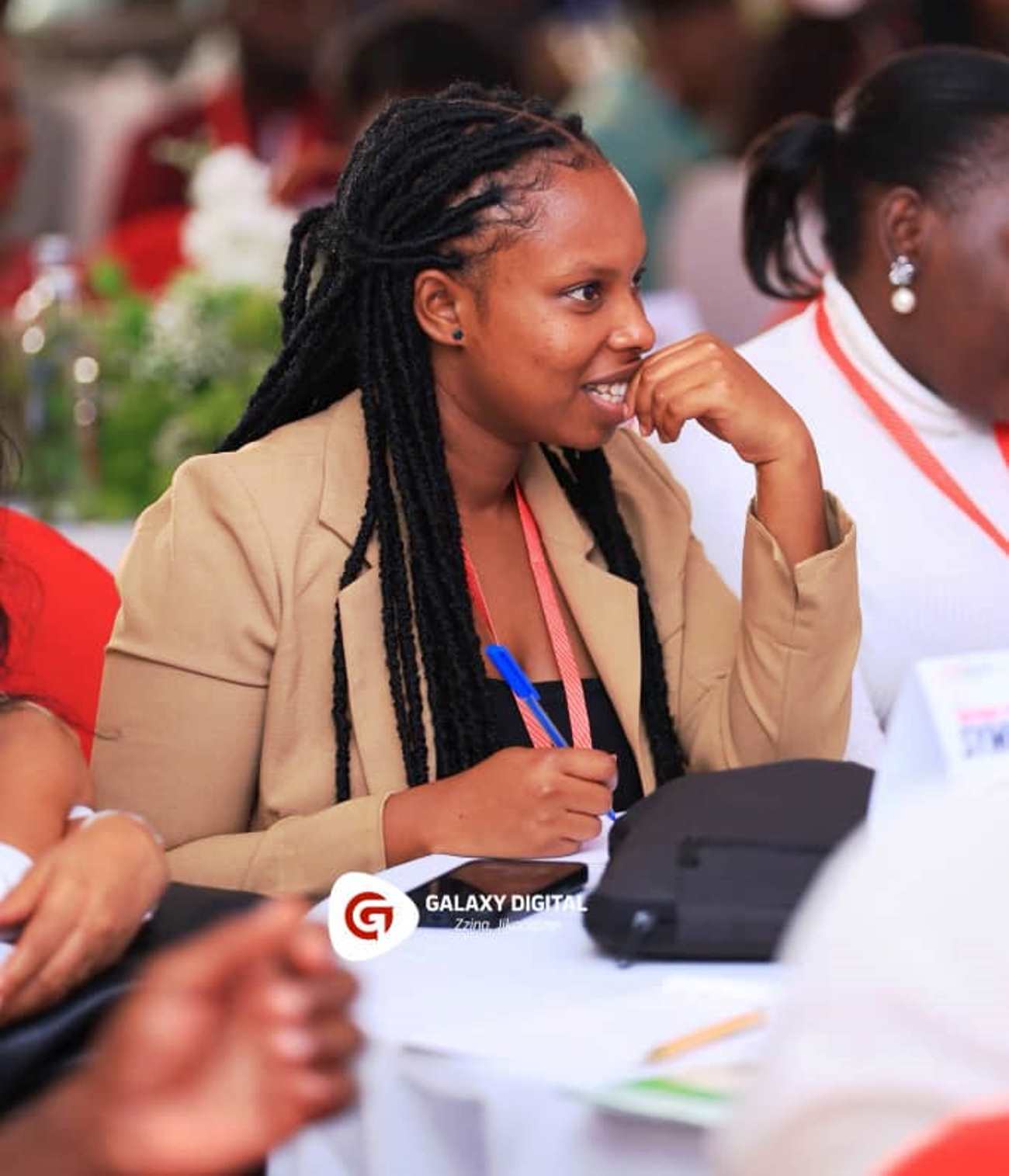
She wanted theory anchored in practice. And then there was the commute.
From Nabbingo, a hill in Wakiso District, some 18.6 km to Kampala, where the Makerere Main campus is situated, and back, nearly 20 hours a week dissolved into Kampala traffic. Two-hour journeys before 8:00 a.m. lectures. Dust. Noise. Headaches. She learned to manage energy the way others manage time. Fatigue became a tutor in resilience.
“I had to be intentional with every remaining hour,” she says. “Excuses were not an option.”
Learning to Practice Communication
If classrooms taught her analysis, presentations taught her courage. Pitching projects, defending research, and standing before peers quick to critique forced her to think on her feet. She was no longer simply studying communication; she was practicing it.
In 2024, the AGMES Fellowship at the Aga Khan Graduate School of Media and Communication pushed her further. She received funding to produce a capstone project on the mental impact of gender-based violence on survivors. She identified sources, conducted interviews, handled trauma with care, and worked with professional editors.
The Communication, she learned, is logistics and ethics as much as eloquence.
The Future She Sees
Whitney is optimistic about Uganda’s media landscape. The digital shift, she believes, has democratized influence. Young communicators are no longer confined to legacy newsrooms or offices.
Yet she sees a gap in the absence of structured research on sustainable, ethical, profitable independent media ventures in Uganda. Her ambition is not only to practice communication, but to study it. To produce data-backed frameworks that help young Ugandans transition from graduates to media entrepreneurs.
She wants to make the impact scalable.
What Remains
As the only First-Class graduate in her cohort, she is careful not to mythologize herself. “Success isn’t brilliance alone,” she says. “It’s a daily commitment when nobody is watching.”
Even before graduation, Whitney had stepped into the industry through a mentorship internship at Capital One Group (COG EA Ltd), a strategic marketing communications agency operating across East Africa.
At Capital One Group, we spoke to Paul Mwirigi Muriungi, the Managing Director and Head of Strategy, who spoke of Najjuka as a progressive and intentional young professional who approaches her work with curiosity, maturity, and responsibility.
“Her attitude is exemplary. She is teachable, receptive to feedback, and eager to grow. While technical skills can be taught, character, work ethic, and mindset determine long-term success, qualities that Whitney consistently demonstrates. Given her academic excellence and professional application, we believe she has a bright future both at Capital One Group and within the wider communications industry. She represents the kind of talent the profession needs: thoughtful, adaptable, and committed to excellence.
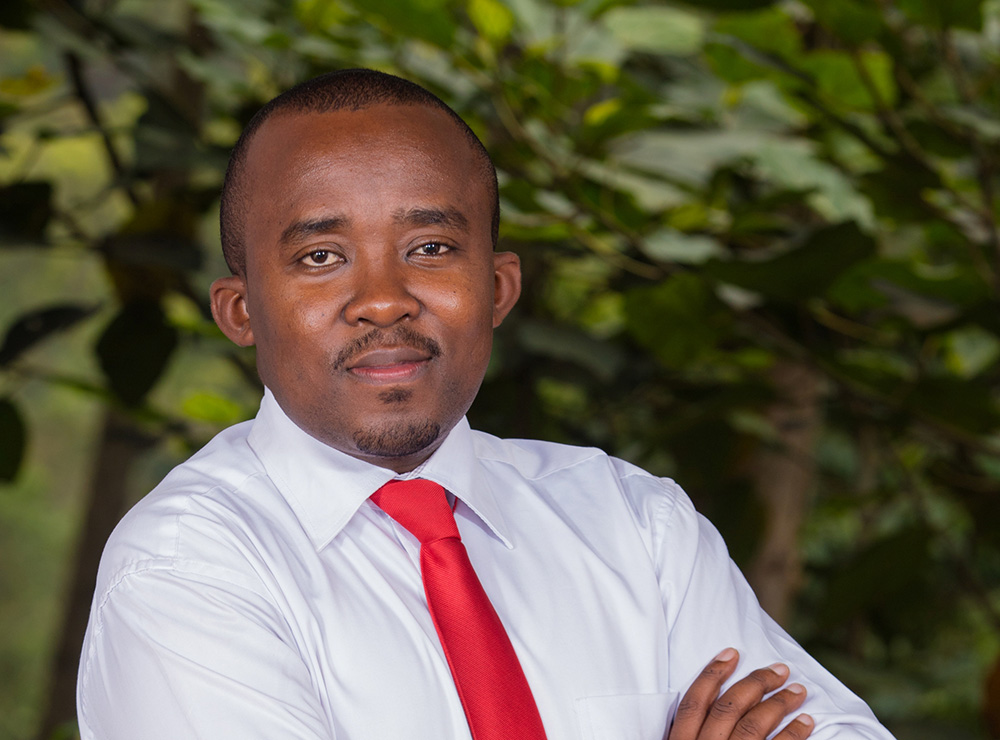
“We look forward to seeing her next chapter unfold,” says Mwirigi.
Najjuka’s gaze extends beyond her own trajectory. She speaks of what the Department could become. Furnished and equipped with industry-standard equipment, newsroom simulations, and deeper investment in data journalism as prayers. Her excellence is not self-congratulatory, but it is forward-looking.
“The University should support the Department to procure industry-standard equipment. Access to high-quality cameras, sound booths, and updated editing software like Adobe Creative Suite is critical to our learning environment,” she says.
Adding that, “We need a newsroom simulation, a physical or digital space where students work under real-time deadlines to produce content for the public. That would prepare us for industry and even strengthen the University’s own media platforms.”
In an era defined by metrics, algorithms, and digital traceability, data journalism is no longer a niche skill but a sine qua non of credible reporting. “There should also be more focus on data journalism and search engine optimization. These are no longer optional skills. Students would benefit immensely from stronger training in these areas.”
Dr. Aisha Nakiwala, the Head, Department of Journalism and Communication, says the faculty are very proud that she is graduating with a First Class—the only one in this year’s cohort.
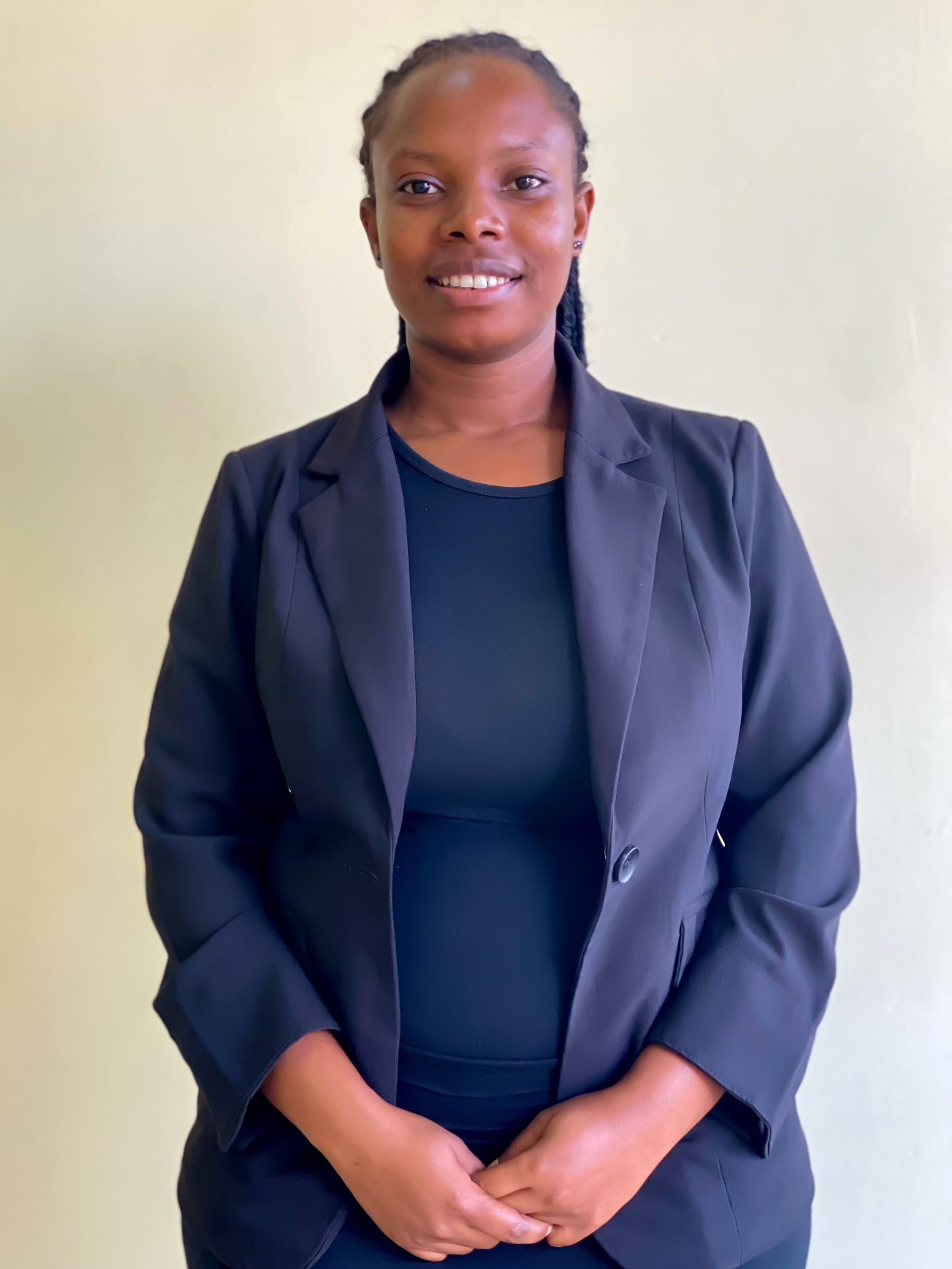
“This achievement reflects not only exceptional intellectual ability but also discipline, resilience, and sustained dedication to the highest standards over four years. Graduating with first-class honors is no small feat; it requires consistent outstanding performance.
“Her accomplishment sets a powerful example for continuing students and reaffirms our department’s commitment to nurturing excellence. We are confident she will make meaningful contributions to the communication profession and society at large,” says Dr. Nakiwala.
On graduation day, applause will crest and recede. The gowns will fold back into wardrobes. The transcripts will be filed away in cabinets. But something quieter will endure; a young woman from Nabbingo who once missed her Law mark, who spent 20 hours a week on the road, who discovered that storytelling is power, and who now walks into Freedom Square not by accident, but by intention.
Life, as she has come to understand it, lives on.
Humanities & Social Sciences
Dr. Pamela Khanakwa Honored for Steering Record 18 PhD Candidates for the Mak 2026 Graduation
Published
1 month agoon
January 23, 2026By
Jane Anyango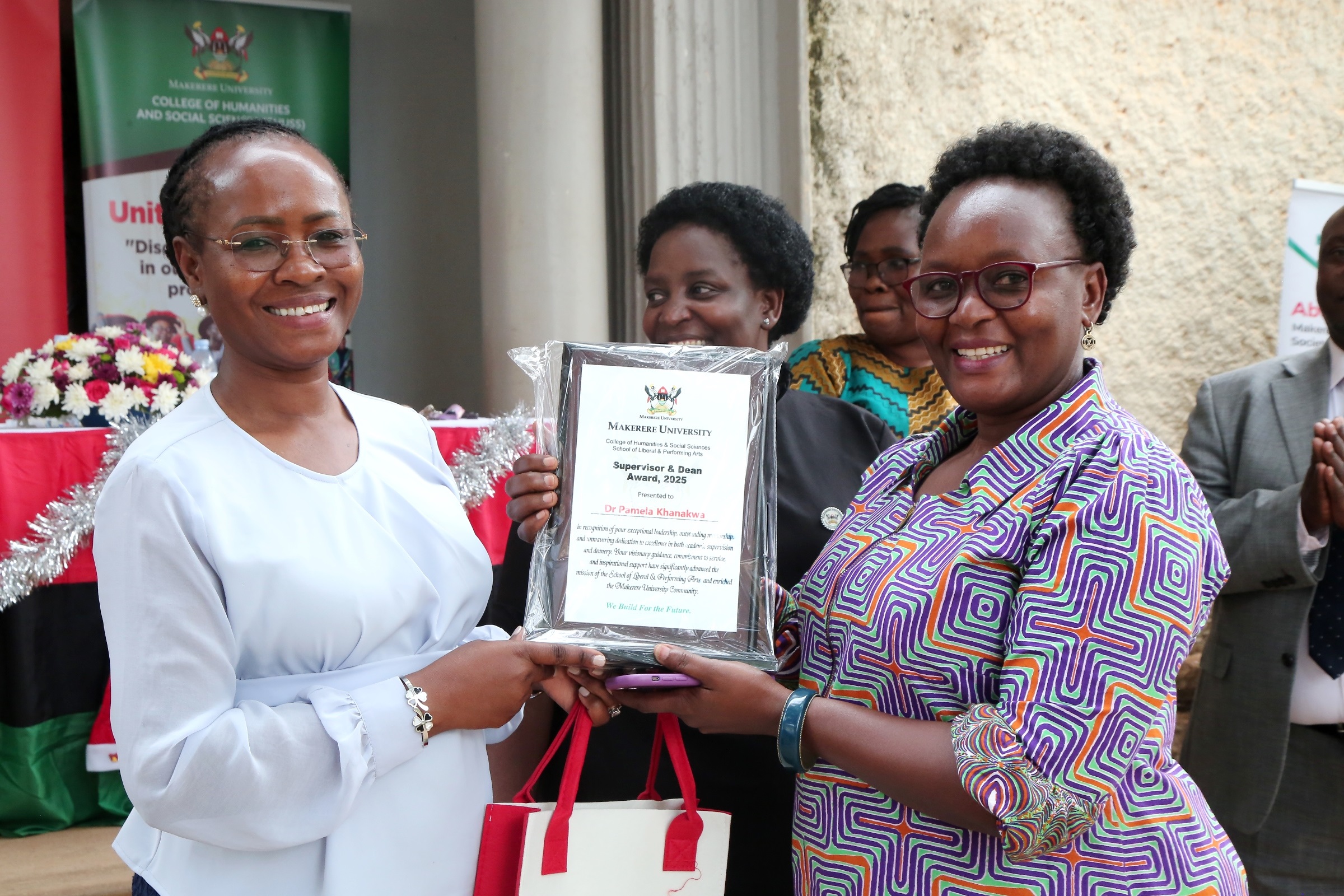
Six personally supervised, three completed in record time, as School of Liberal and Performing Arts sets a historic milestone. Dr. Pamela Khanakwa got the Award as Best PhD Supervisor and Dean
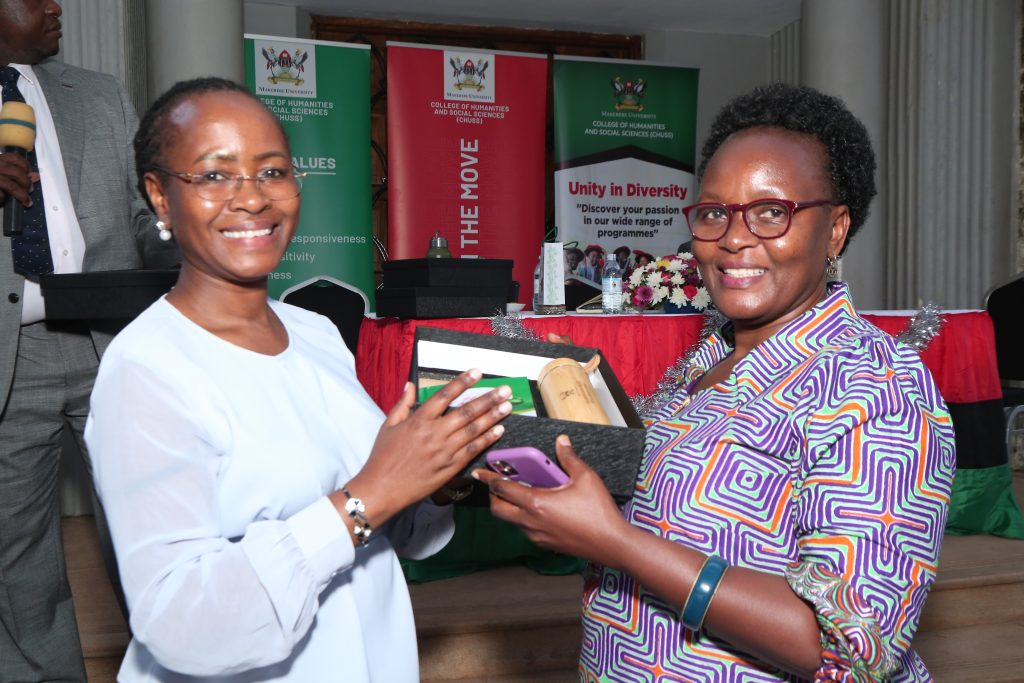
A Historic Academic Milestone for SLPA
The College of Humanities and Social Sciences (CHUSS) recognised the Dean of the School of Liberal and Performing Arts (SLPA), Dr. Pamela Khanakwa, for outstanding academic leadership that has seen the School field 18 PhD candidates for the next 2026 Makerere University Graduation Ceremony scheduled for 24th-27th February. Remarkably, six of these doctoral graduates were directly supervised by Dr. Khanakwa, with three completing within the official three-year timeframe, an exceptional achievement in graduate training. The recognition was announced during the CHUSS End-of-Year Get-Together, where staff applauded Dr. Khanakwa’s dedication, humility, and relentless commitment to postgraduate supervision and timely completion.
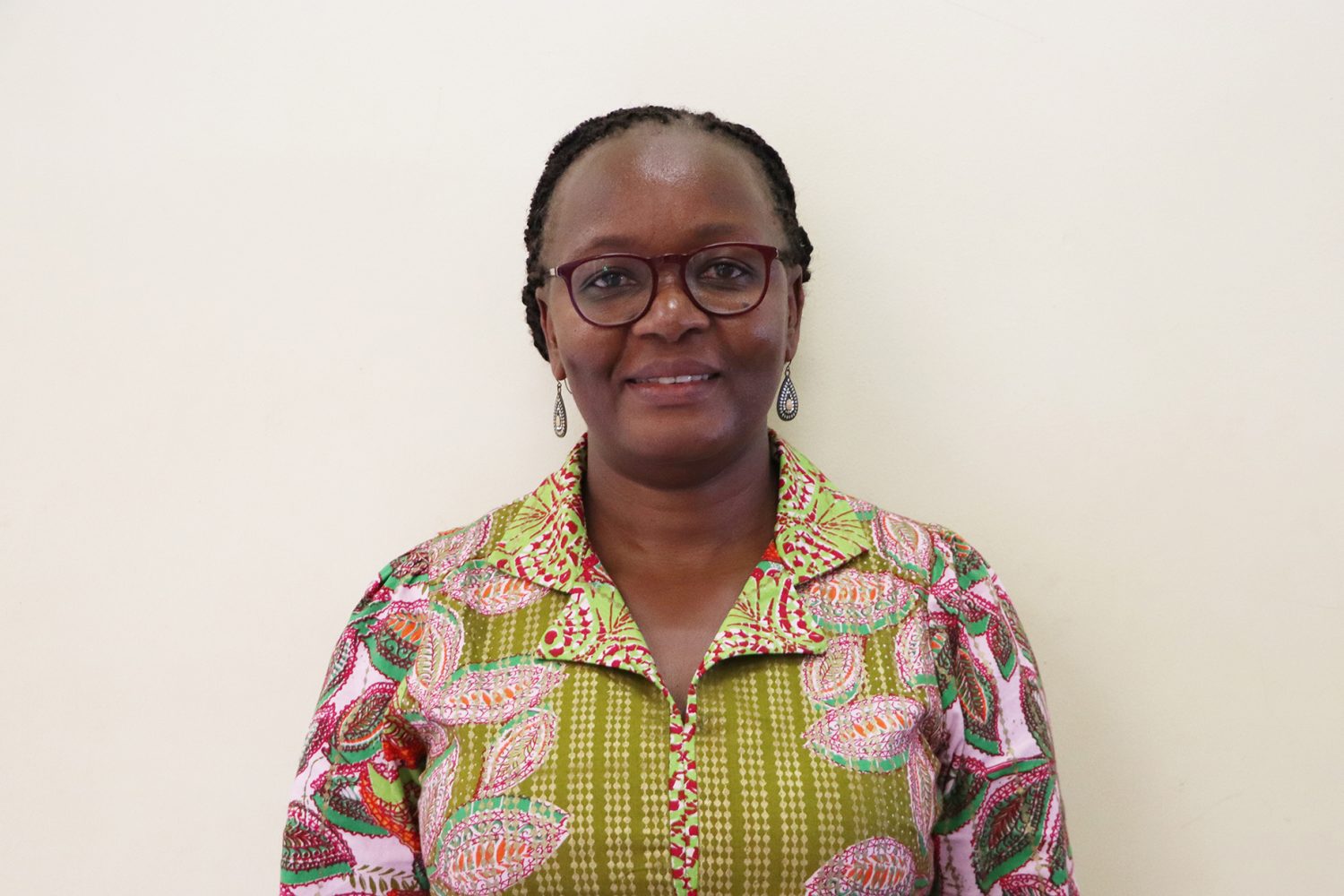
Message to Academic Staff
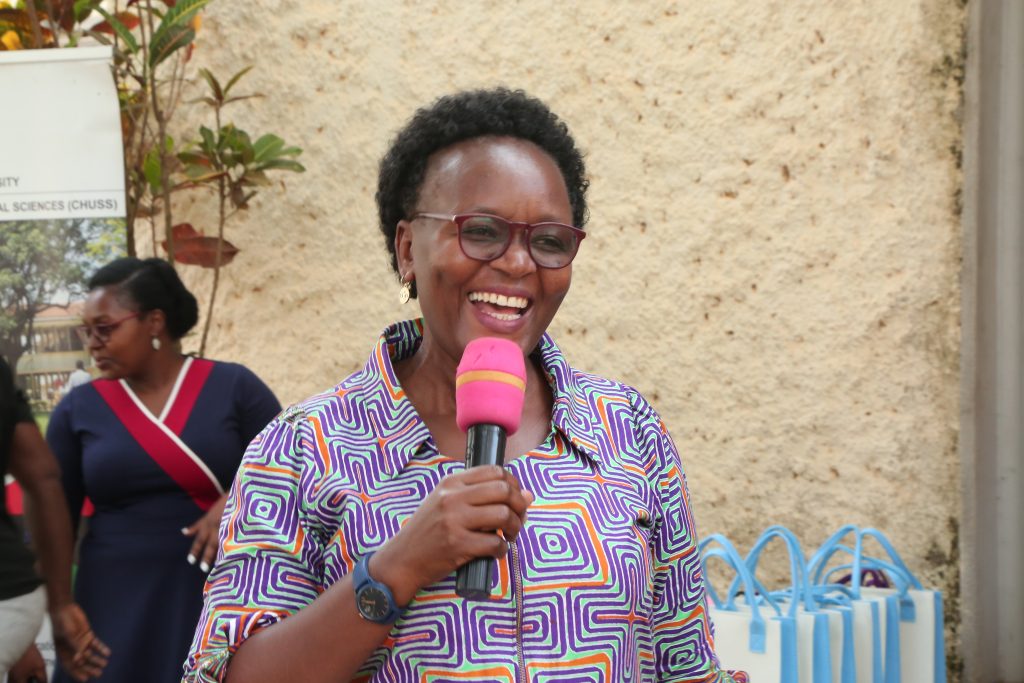
Q: What message do you have for your staff following this achievement?
Dr. Khanakwa:
First, I celebrate my staff and thank them for their dedication to supervision and student support. Academic work is demanding, and material rewards are often limited, but the true satisfaction comes from seeing students succeed.
I encourage my colleagues to remain committed. Yes, the workload is heavy, but many things are possible with dedication and teamwork. Let us continue working for the good of our students, our School, and Makerere University.
Leadership Rooted in Humility
Q: Many colleagues describe you as humble, down to earth, and hardworking. What shapes this character?
Dr. Khanakwa:
I think it is largely my upbringing. My mother was a primary school teacher from the 1950s until the mid-1980s. She worked extremely hard to raise us, combining teaching with farming to ensure we had school fees and basic needs. From her, I learned humility, discipline, and the value of hard work.
I also learned that leadership positions are temporary. You occupy them today, and tomorrow you move on. So humility is essential.
My graduate training also shaped me significantly. My PhD supervisor emphasized that graduate study is a full-time job and that results matter more than noise. Let people see your work through outcomes, not announcements.
Supervision as a Two-Way Commitment
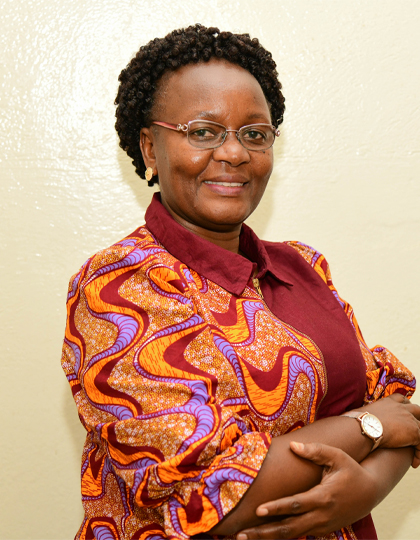
Q: How would you describe your supervision style?
Dr. Khanakwa:
I read my students’ work thoroughly, word by word. Sometimes my comments are tough, but they are honest. Supervision is a two-way commitment. I give feedback, but students must also respond and remain engaged. When that relationship works, progress happens.
Balancing Leadership, Scholarship, and Family
Q: How do you balance being a Dean, scholar, wife, mother, and daughter?
Dr. Khanakwa:
Honestly, I am not sure I balance perfectly. My mother lives far away in Bukwo, so visiting requires careful planning. My children grew up understanding the demands of academic life. I pursued my PhD in the United States and spent long periods away, but we adapted as a family.
Work has become part of my lifestyle. I use weekends to read dissertations, review manuscripts, and write. Sometimes my children ask if I ever sit without working, but this is the commitment I made. As we often say jokingly, “We humbly applied for the job, so let us do the job.”
Scholarship Beyond Supervision
Dr. Khanakwa is also an active scholar and editor. In the past year alone, she has:
- Edited scholarly volumes on archives, memory, method, and pedagogy
- Published a book with Routledge Companion
- Co-authored journal articles and book chapters with graduating students, including Priscah Asiimwe and Anatoli Lwasa Mpijja
“I feel an obligation to write with students,” she notes. “It takes time, energy, and commitment, but it is part of academic mentorship.”
Who Is Dr. Pamela Khanakwa?
Dr. Pamela Khanakwa is the Dean, School of Liberal and Performing Arts, College of Humanities and Social Sciences, Makerere University. She is a seasoned scholar, supervisor, administrator, and mentor whose leadership continues to redefine graduate training excellence. Details about Dr. Pamela Khanakwa can be accessed at: https://chuss.mak.ac.ug/en/personnel/pamela-khanakwa/
More details are available in her attached curriculum vitae.
The CHUSS End- Of-Year-Get-Together
On 12th December, 2025 the college leadership organised a get-together end of year gathering to take stock of the achievements, challenges and brainstorm together on how to move forward. The event was marked by entertainment, team building games, appreciation speeches, sharing a meal and a Christmas package for every staff
Retirees and staff recognised
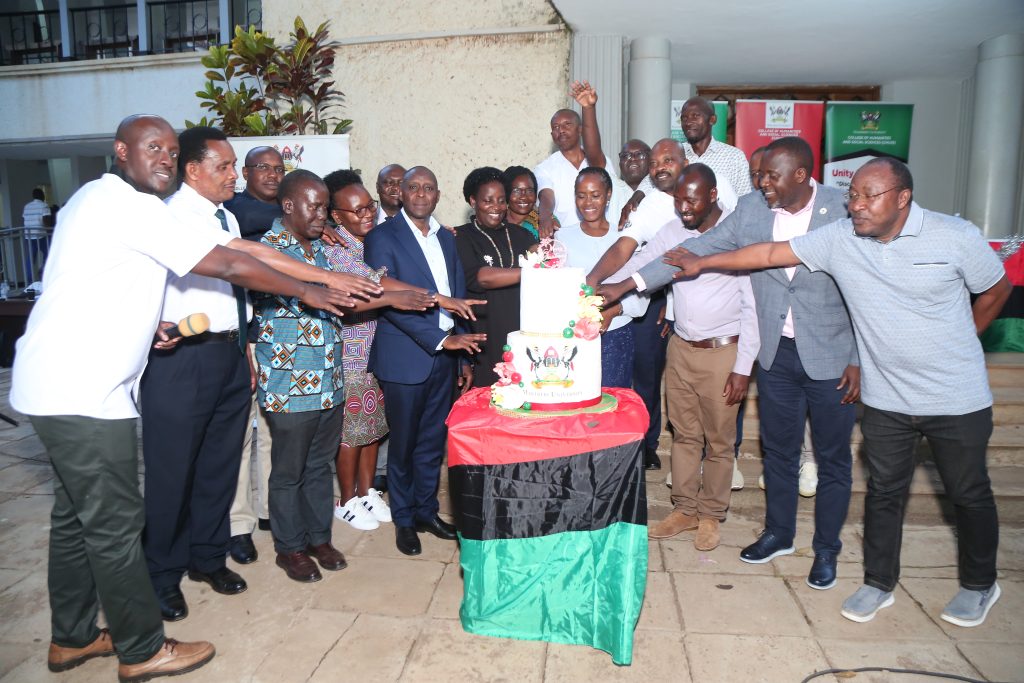
Five retired staff Dr. Micheal Wangotta Masakala, Dr. Anatole Kirigwajjo and Dr. Jackson Kizza Mukas (all from the School of Languages, Literature and Communication), Assoc. Prof. Florence Nansubuga (School of Psychology), Dr. Tusabe Gervase (School of Liberal and Perforing Arts) and Ms. Scovia Nganda Sekweyama (secretary from the School of Social Sciences) were recognised for their dedicated services to the university.
In addition to Dr. Pamela Khanakwa’s Award as Best PhD Supervisor and Dean, Ms. Birabwa Florence scooped the award of Best Registrar of the year. Birabwa is the registrar for the School of Liberal and Performing Arts.
Administrative and support staff including Ms. Mary Gyezaho and Annet Kashumbusha(both administrative secretaries in the Principals office), Farouq Lule (IT Officer), Godfrey Kakooza (cleaner), Charles Sebuguzi (driver) and Jane Anyango (Communications officer) were recognise with awards for outstanding service. Dr. Mohamed Mayanja Kajumba was from the School of Pyschology was recognised as the person with an outstanding talent in Handwriting.
The celebrations held in the Arts quadrangle were graced by the Vice Chancellor Academic Affairs Prof. Sarah Ssali and the Deputy Vice Chancellor in charge of Finance and Adminstration Prof. Ireeta Tumps.
Humanities & Social Sciences
Ugandan Journalists Trained on Peace and Gender-Sensitive Reporting Ahead of 2026 Elections
Published
2 months agoon
January 9, 2026By
Jane Anyango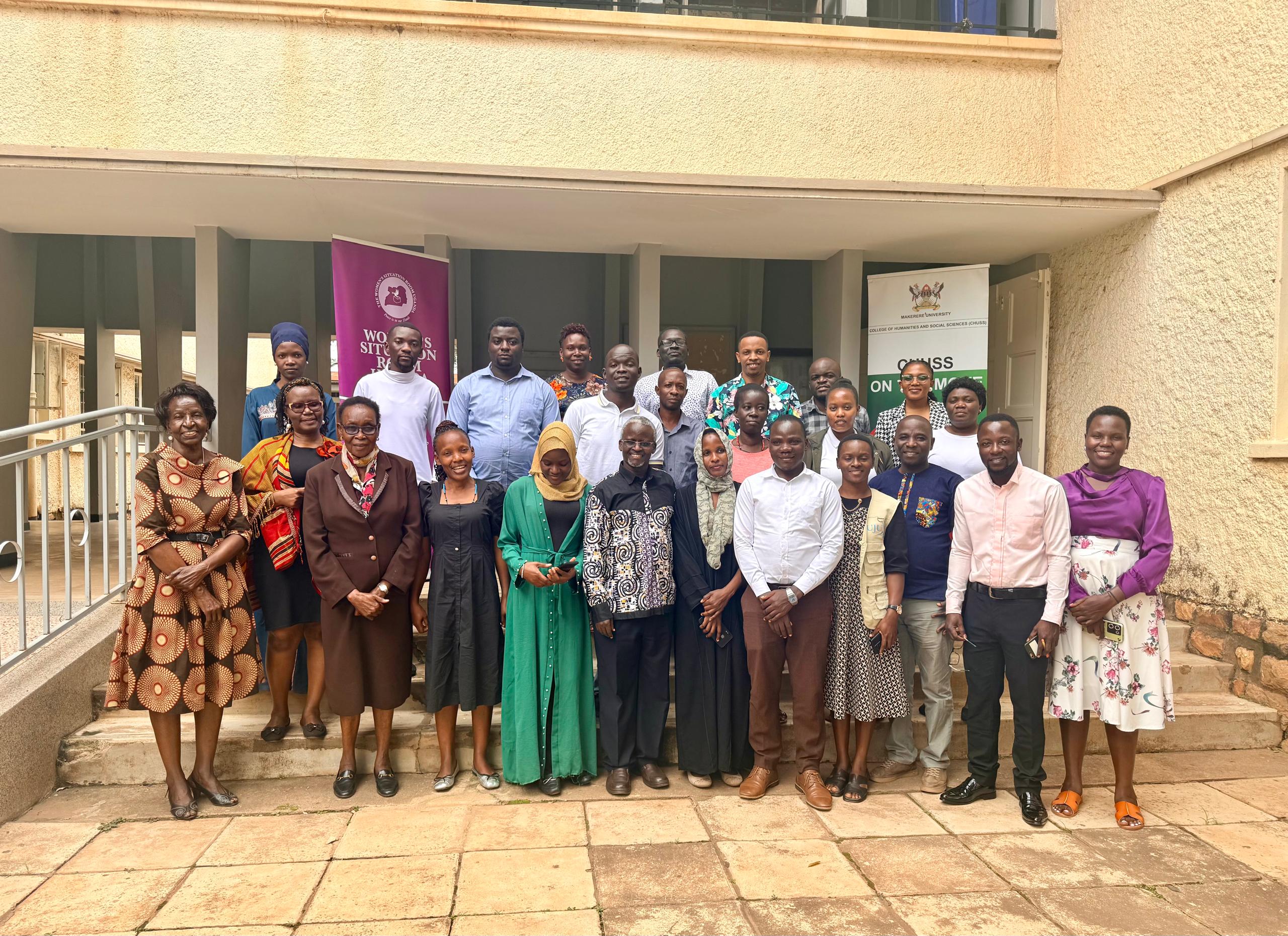
Kampala, Uganda – January 9, 2026
Ahead of the January 15 general elections, Ugandan journalists have undergone specialized training on peace and gender-sensitive reporting to ensure responsible media coverage during the election period. The two-day training, held from 8th to 9th January 2026 at Makerere University’s College of Humanities and Social Sciences Smart Room, was organized by the Women’s Situation Room (WSR) in partnership with various stakeholders and brought together journalists from across print, broadcast, and online platforms.
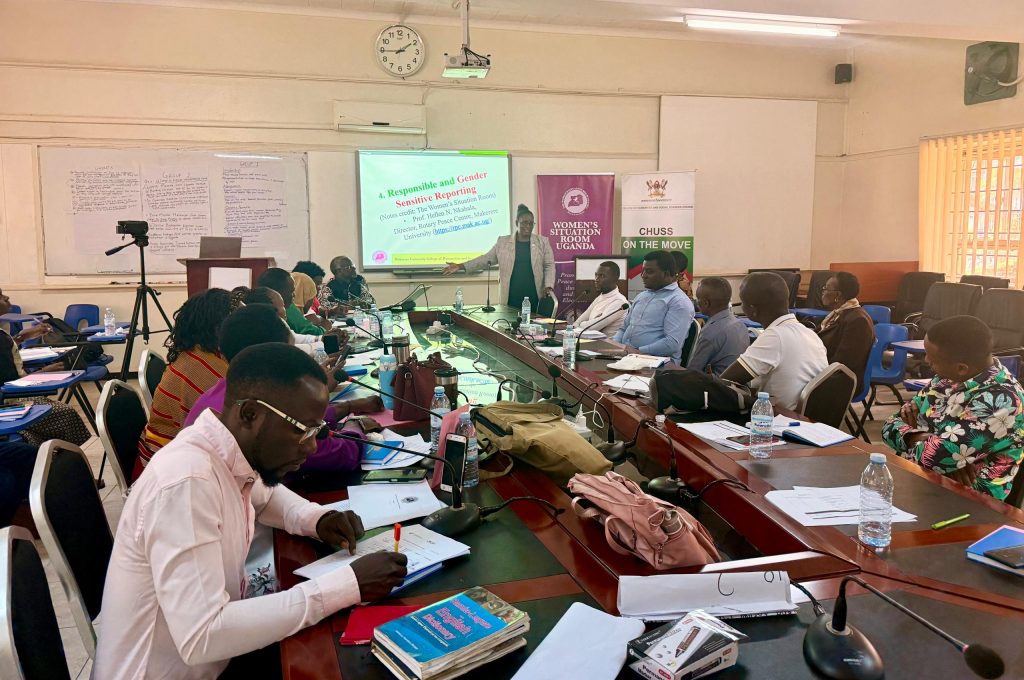
The main objective of the training was to strengthen the capacities of media in reporting and documenting electoral processes in a responsible and gender-sensitive manner. The specific objectives included: strengthening journalists’ skills to cover the 2026 elections in a fair, balanced, gender-sensitive, and non-violent partisan way; enhancing the role of media to enable citizens to be well-informed and actively participate in the election process; ensuring focused and balanced reporting on peace during and after elections; and strengthening partnerships between the WSR and media houses during the election period.
The training covered multiple critical modules. Day one focused on responsible conflict-sensitive reporting, emphasizing principles such as balance, impartiality, and accuracy. Participants explored the role of media as a relayer of the population’s voice, election monitor, catalyst for social cohesion and reconciliation, contributor to the accountability of political actors, and a platform for detecting and debunking digital media misinformation and hate speech.
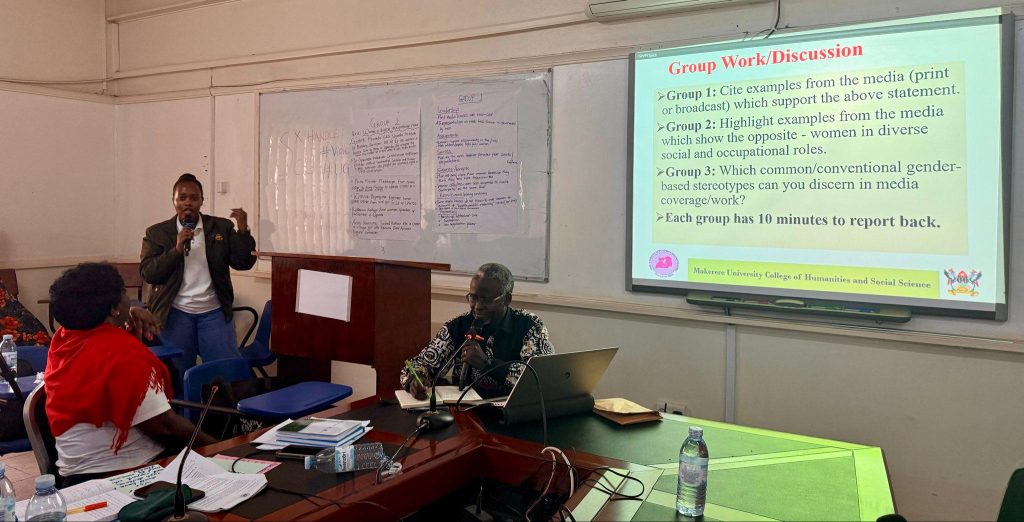
Day two addressed responsible and gender-sensitive reporting. Key aspects included the definition of gender-sensitive reporting, how to become a gender-sensitive reporter, critical elements in reporting with gender awareness, packaging gender-sensitive stories, and a checklist for detecting and avoiding gender-insensitive reporting.
Her Lordship, retired Judge Justice Mary Mayitum, emphasized the importance of peace as the foundation of development and democratic engagement. “Because we value peace more than anything. Without peace, really, you can do nothing. But where there is peace, you can have time to reflect, discuss with others, and join in meaningful dialogue,” she said. She warned that the country’s past conflicts, such as those in Gulu, underscored the necessity of maintaining national harmony.
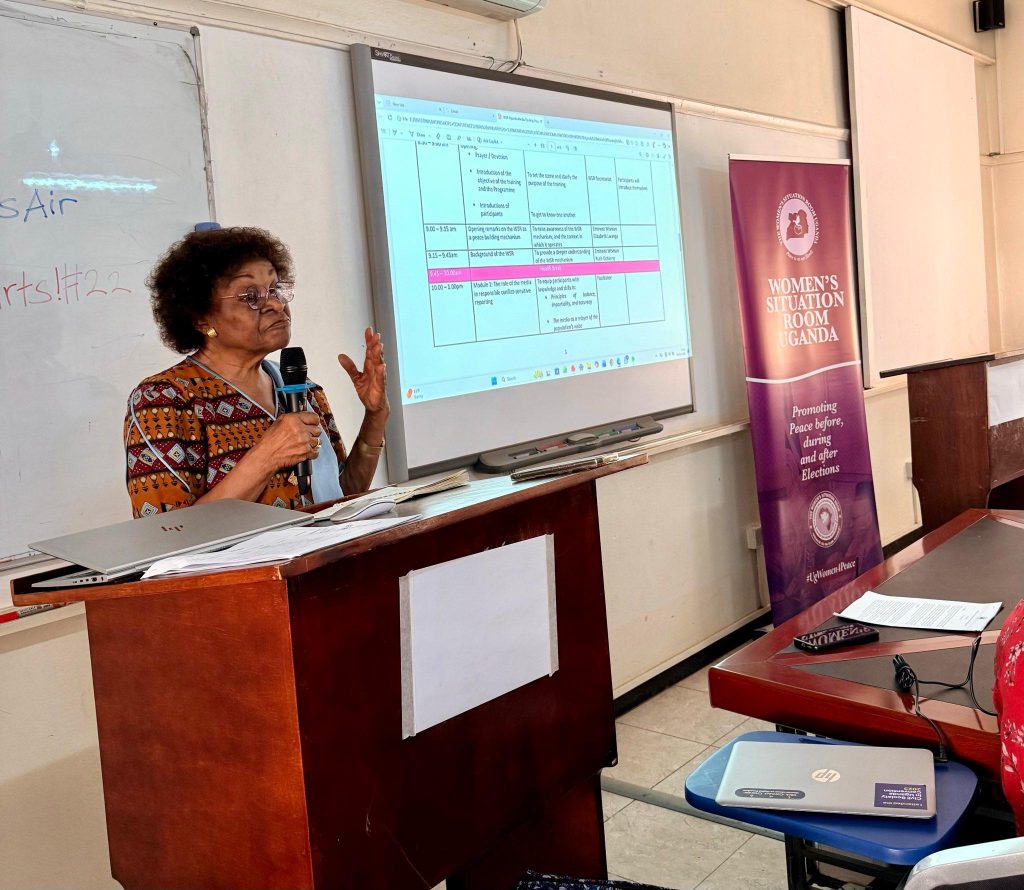
Justice Mayitum also urged other key election stakeholders to uphold peaceful conduct. “Being peaceful is the very heart of life. We have spoken to police, security personnel, political parties, and the Electoral Commission. We want politicians to have a code of conduct and to understand that it’s okay to think differently without fighting or hating one another,” she added.
Dr. William Tayebwa, lead facilitator and senior lecturer in the Department of Journalism and Communication at Makerere University, said, “This training is about conflict-sensitive reporting, peace journalism, and gender-sensitive reporting in the context of the elections. The emphasis was on giving female political candidates a voice while ensuring journalists report responsibly on election-related matters.”
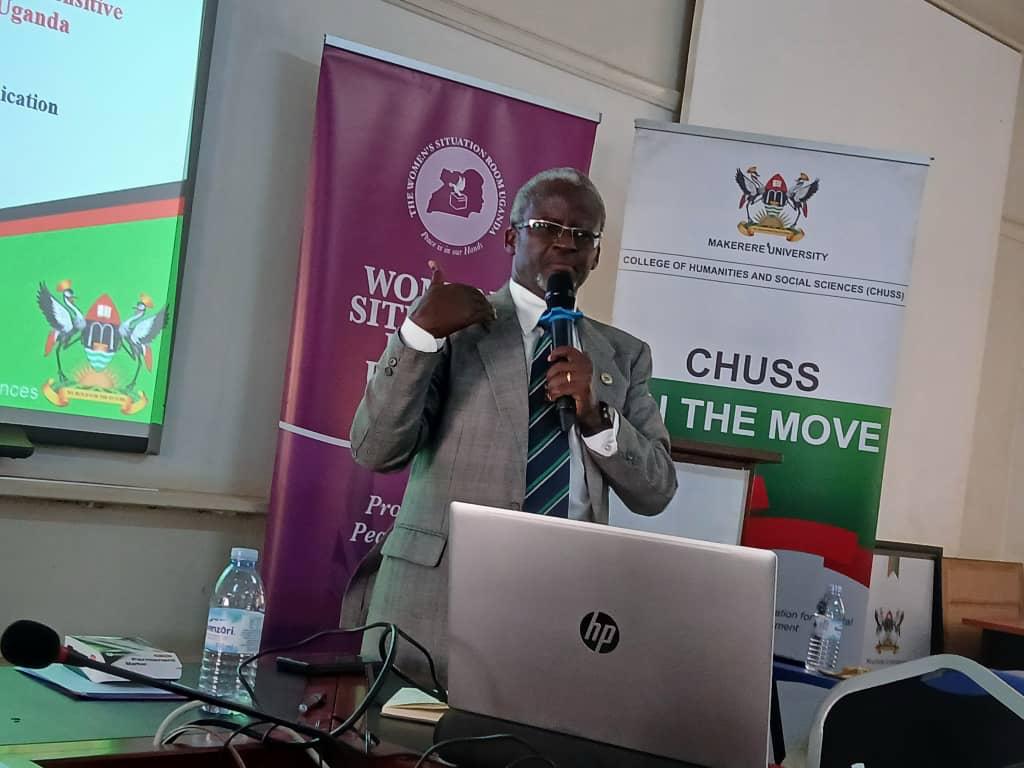
Participants described the training as timely and impactful. Tony Banizengabo of CBS Wakiso District said, “We’ve benefited a lot. We’ve been trained to write stories which bring peace, not conflict. Ahead of the elections, we are very ready to be part of peacemakers.”
Dorcas Kimono of UBC TV Kampala added, “It was so timely and rich. We learned how to report without promoting or fueling violence, giving voice to victims without angering them or encouraging violators. This is very vital, especially as we approach the 2026 elections.”
The training aims to equip media personnel with the knowledge and skills to uphold professional ethics while contributing to a peaceful, inclusive, and gender-sensitive electoral process.
Trending
-

 Humanities & Social Sciences2 days ago
Humanities & Social Sciences2 days agoMeet Najjuka Whitney, The Girl Who Missed Law and Found Her Voice
-

 Health6 days ago
Health6 days agoUganda has until 2030 to end Open Defecation as Ntaro’s PhD Examines Kabale’s Progress
-

 Agriculture & Environment5 days ago
Agriculture & Environment5 days agoUganda Martyrs Namugongo Students Turn Organic Waste into Soap in an Innovative School Project on Sustainable Waste Management
-

 General6 days ago
General6 days agoMastercard Foundation Scholars embrace and honour their rich cultural diversity
-

 Health2 weeks ago
Health2 weeks agoCall for Applications: Short Course in Molecular Diagnostics March 2026
